#kinnporsche the series meta
Text
Turtles Catches Up With Old GMMTV: KinnPorsche, and Analyzing the KP Cultural Zeitgeist Edition (Part 2)
[What’s going on here? After joining Tumblr and discovering Thai BLs through KinnPorsche in 2022, I began watching GMMTV’s new offerings -- and realized that I had a lot of history to catch up on, to appreciate the more recent works that I was delving into. From tropes to BL frameworks, what we’re watching now hails from somewhere, and I’m learning about Thai BL's history through what I’m calling the Old GMMTV Challenge (OGMMTVC). Starting with recommendations from @absolutebl on their post regarding how GMMTV is correcting for its mistakes with its shows today, I’ve made an expansive list to get me through a condensed history of essential/classic/significant Thai BLs produced by GMMTV and many other BL studios. My watchlist, pasted below, lists what I’ve watched and what’s upcoming, along with the reviews I’ve written so far. Today, I conclude a two-part series on my thoughts on KinnPorsche, my very first Thai BL, and the impact that I think KP has had on the Thai BL industry since 2022.]
Top of the morning (or whatever time zone you're in) to ya! Yesterday, I ruminated on KinnPorsche's foundation in regards to how the show wasn't as innovative as newbie members of the Thai BL fandom, like myself, may have thought in 2022 -- but was rather a great example of a show that derivatively used a lot of excellent past Thai BL influences in order to make a newly stylized show that I think, for the most part, worked well.
Harkening back to the outline for these two pieces that I laid out yesterday, this post will concentrate on:
3) How I think KP has impacted how other studios approach, market, and write Thai BLs now, and
4) A quick passing thought on BOC's own continued influence on the Thai BL genre and industry since 2022, particularly by way of Dead Friend Forever.
Before I get fully into point 3, I wanted to take a second to offer one more thought on an element about the KinnPorsche series itself that I didn't unwind on much yesterday, and one that'll connect with point 3 in a second. I mentioned yesterday that I personally (in my own opinion, I am accountable here) don't think that some of the VegasPete elements of the show helped the show's flow and continuity at all times. After my rewatch, I think the show could have stood for more episode editing to better its flow. I very much know how beloved VegasPete are in much of the KP fandom (thanks so much to dear friend @wen-kexing-apologist for the conversations about this during my rewatch!), so I don't want to pooh-pooh very hard, because at the same time, I think Bible as an actor was valuable to the show regarding Vegas's interactions with Porsche -- that side storyline offered intrigue and depth particularly into Porsche's mindset at the end of the series. At the same time, I think the VegasPete scenes contained enough questionable takes on trauma and attraction that I think now contribute to the show's legend and status as a uniquely heaty drama, but (in my opinion, people, I own this!), I think some of those takes could have been removed, smoothed, or tamped down for editing's sake, vis à vis those questionable takes in particular.
Taking VegasPete's trauma-and-kink-driven storyline, and KinnPorsche's romps and unravellings, into consideration, along with the show's excellent use of comedy as a plot driver: I think that KinnPorsche has clearly had an impact on how subsequent "heat" BL dramas have been created and marketed since KP's run. I'm thinking in particularly of some big ones (heh heh), including 2023's Only Friends, and 2023-24's Playboyy (which I did not finish, FYI).
Heat -- and the increasing use and management of it -- has long been an important element of the Thai BL industry. Like I said yesterday, MaxTul (my beloved) were pioneers of it in Together With Me and Manner of Death, and MAME consecrated episodic heat in 2019's TharnType, and even introduced enough of it notably in 2018's Love By Chance by way of those awesome spicy AePete scenes. And the WONDERFUL Lovely Writer offered meta commentary about the dependence that the Thai BL/Series Y industry has on heat in order to drive in fans, oftentimes to the detriment of more interesting and/or fulfilling and/or emotionally complicated plots.
KinnPorsche's lengthy marketing, from its Filmania days in 2020 and 2021, to its eventual 2022 premiere through Be On Cloud, certainly helped to drive interest and intrigue in the show, from the debut pairing of MileApo, to the clear use of heat that the show was promising before its airing. (Red Peafowl could never.)
Looking at the moment we are in right now -- early spring of 2024, with the ability to look back on the conclusions of both Only Friends and Playboyy -- I see the influence that KinnPorsche had on these shows being HUGELY marketed as cutting-edge-entrées to a high-heat and high-interest slice of Thai BL, particularly for Only Friends, which was GMMTV's own first step into really high-heat territory.
Both of the shows ended in meh territory (and both shows were written by the same writer in Den Panuwat, who may very well have a monogamy kink). Both shows ended up putting pure monogamy on a pedestal, and seemed to judge extra-monogamous sex as a "mistake" that was worth rectifying through "true," i.e., monogamous, love.
I posit, and I'm glad, that KinnPorsche did NOT go this route. Extracurricular sex wasn't even in the show's genes anyway, but -- the heat that KP marketed at the time of its premiere was solely associated with the centralized romances of the two main pairings. KinnPorsche didn't have to get extra-monogamously messy in its bones (huh huh) in order to be hot -- and it makes me curious to wonder why shows like Only Friends and Playboyy felt the need to promote relational messiness as a way to hype up their heat, all of which kinda putzed out in the end run of both of those shows.
Of course, we've still had heat in many other shows since KP's premiere, including in directions that roundly surprised the larger fandom, such as Pit Babe's take on omegaverse, and maybe even the vets Earth and Mix getting hot and heavy in Moonlight Chicken, a direction that Aof Noppharnach has been known to not take for the sake of keeping the ratings on his shows kid-friendly. But I do find it interesting that the heavy promotion of Only Friends and Playboyy led the fandom to think that these shows were going to have progressive takes on sex and sexuality, when they ultimately did not (I'd even argue that both of these shows ended up being judgemental of sexual experimentation). And while I don't think KinnPorsche's takes on heat were necessarily progressive, I do think the marketing of their actors getting into that, particularly as compared to Apo's previous career path in leaving acting for a while, was notable -- and as well, the care that the show took to depict heat scenes with excellent cinematography makes many of those scenes so memorable today.
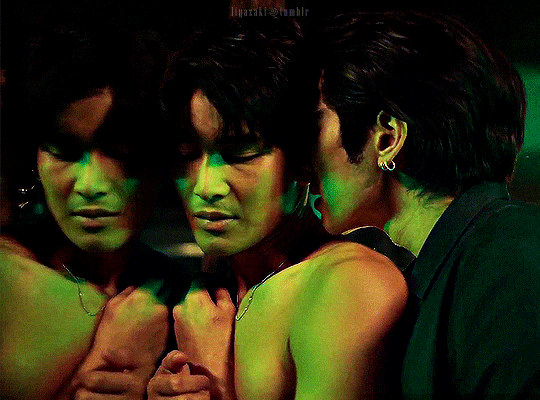
I want to make one final note about KinnPorsche's and Be On Cloud's general influence on the Thai BL industry, in that I'm impressed by their investment in generally good-to-great writing and directing. As I overviewed yesterday, KinnPorsche heavily featured veterans from across the BL landscape, and Be On Cloud's latest serial offering, Dead Friend Forever, continued that trajectory, having an OG BL director in Ma-Deaw Chookiat partly take the helm of that show. Very importantly, Ma-Deaw Chookiat has been the screenwriter and director of a number of seminal Thai queer films and shows, including 2019's Dew, and more impactfully, 2007's The Love of Siam, which is considered a harbinger of the television Thai BL industry, and a film that has notably influenced important Thai BL creators, especially New Siwaj, who doesn't hesitate to include references to LoS in many of his shows, including Until We Meet Again, My Only 12%, and more. Chookiat has also screenwritten and/or directed three shows written by the notable Thai Y novelist, Sammon, in DFF, Manner of Death, and Triage. Sammon has been on a tear recently, as she will be the screenwriter for BOC's upcoming drama, 4 Minutes, as well as Spare Me Your Mercy, the hugely anticipated BL drama starring Tor Thanapob and singer Jaylerr.
Going back to my thoughts earlier about big marketing of big BLs: we've seen some duds recently from shows that were marketed at a big tip, from OF, to Playboyy, to Idol Factory's The Sign. From what I've gathered from the Tumblr tag regarding The Sign -- it seems that show suffered mostly from a lack of editorial context and plot sensibility and tightness, and that there could have been a good show, if the show had spent less money on CGI, and more money on the script.
Be On Cloud seems to mostly be putting its money where its pen is. I say "mostly" as a caveat. Was the ending of DFF fantastic? No, and I totally admit as much: while the show mostly stuck to its slasher genre conventions (thank you so much to @lurkingshan, my genre guru, for explaining this to me), the show seemed to poop out in the end by giving us a PheeJin BL ship, instead of Phee's and Jin's gruesome deaths. Womp womp. The pull of BL, and the need for clean-ish endings for the fujoshi crowd, may still be too economically enticing for studios, including Be On Cloud itself.
But I'm optimistic for BOC's upcoming shows, with the talent and money they're putting into scripts and directing. And we know that BOC's first film, the non-queer Man Suang, was an important artistic point for the studio as it continues its investment in MileApo and experimental content to market within and outside of Thailand. It was important enough that Dead Friend Forever, emanating from the Thai BL world, took on an entirely different genre instead, and literally presented that back to BL fans on a silver platter. I hope 4 Minutes can tread similar experimental territory. And I'm glad to see Be On Cloud being able to invest in high-quality writing and directing after the publicly major obstacles the studio experienced last year during the Build Jakapan scandal.
From the time I discovered Thai BLs in 2022, to now: I would not have expected KinnPorsche and Be On Cloud to start such a journey in my personal drama fan life. As well, considering how many damn shows I've now watched from Thailand, I also didn't expect this rewatch of KinnPorsche to be so much fun. AND, I truly didn't realize I had this much to say about it -- but there was a lot of say, especially by way of how referential the original KinnPorsche series was, which touched my little nerdy BL heart.
With that, I say ta-ta to my entrée to this fun world of Thai BLs, and move on to the next one!
[OKAY! We are kind of back of the grind, although my ability to watch dramas has really been hampered by real life obligations and schedules. BUT: I'm trucking along through War of Y, and I have some fun rewatches coming up in The Eclipse (my first-ever GMMTV BL), as well as two new-to-me dramas in GAP (the first GL on the list, WOO!) and My School President, which I can't wait for.
I've made a few tiddly adjustments to the list below, including adding Dead Friend Forever as an important addition, and I'm deep in my giggles with 23.5, which I am LOVING. ONWARDS! For more details about the ongoing list, please checkity-check here!
1) The Love of Siam (2007) (movie) (review here)
2) My Bromance (2014) (movie) (review here)
3) Love Sick and Love Sick 2 (2014 and 2015) (review here)
4) Gay OK Bangkok Season 1 (2016) (a non-BL queer series directed by Jojo Tichakorn and written by Aof Noppharnach) (review here)
5) Make It Right (2016) (review here)
6) SOTUS (2016-2017) (review here)
7) Gay OK Bangkok Season 2 (2017) (a non-BL queer series directed by Jojo Tichakorn and written by Aof Noppharnach) (review here)
8) Make It Right 2 (2017) (review here)
9) Together With Me (2017) (review here)
10) SOTUS S/Our Skyy x SOTUS (2017-2018) (review here)
11) Love By Chance (2018) (review here)
12) Kiss Me Again: PeteKao cuts (2018) (no review)
13) He’s Coming To Me (2019) (review here)
14) Dark Blue Kiss (2019) and Our Skyy x Kiss Me Again (2018) (review here)
15) TharnType (2019-2020) (review here)
16) Senior Secret Love: Puppy Honey (OffGun BL cuts) (2016 and 2017) (no review)
17) Theory of Love (2019) (review here)
18) 3 Will Be Free (2019) (a non-BL and an important harbinger of things to come in 2019 and beyond re: Jojo Tichakorn pushing queer content in non-BLs) (review here)
19) Dew the Movie (2019) (review here)
20) Until We Meet Again (2019-2020) (review here) (and notes on my UWMA rewatch here)
21) 2gether (2020) and Still 2gether (2020) (review here)
22) I Told Sunset About You (2020) (review here)
23) YYY (2020, out of chronological order) (review here)
24) Manner of Death (2020-2021) (review here)
25) A Tale of Thousand Stars (2021) (review here)
26) A Tale of Thousand Stars (2021) OGMMTVC Fastest Rewatch Known To Humankind For The Sake Of Rewatching Our Skyy 2 x BBS x ATOTS (re-review here)
27) Lovely Writer (2021) (review here)
28) Last Twilight in Phuket (2021) (the mini-special before IPYTM) (review here)
29) I Promised You the Moon (2021) (review here)
30) Not Me (2021-2022) (review here)
31) Bad Buddy (2021-2022) (thesis here)
32) 55:15 Never Too Late (2021-2022) (not a BL, but a GMMTV drama that features a macro BL storyline about shipper culture and the BL industry) (review here)
33) Bad Buddy (2021-2022) and Our Skyy 2 x BBS x ATOTS (2023) OGMMTVC Rewatch (Links to the BBS OGMMTVC Meta Series are here: preamble here, part 1, part 2, part 3a, part 3b, and part 4)
34) Secret Crush On You (2022) (review here)
35) KinnPorsche (2022) (tag here)
36) KinnPorsche (2022) OGMMTVC Fastest Rewatch Known To Humankind For the Sake of Re-Analyzing the KP Cultural Zeitgeist (part 1 here)
...interrupting the OGMMTVC list here to watch War of Y (2022) (watching) in chronology to decide if it gets listed...
37) The Eclipse (2022) (tag here)
38) The Eclipse OGMMTVC Rewatch to Reexamine “Genre BLs” and Internalized/Externalized Homophobia in GMMTV Shows
39) GAP (2022-2023) (Thailand’s first GL)
40) My School President (2022-2023) and Our Skyy 2 x My School President (2023)
41) Moonlight Chicken (2023) (tag here)
42) Bed Friend (2023) (tag here)
43 La Pluie (2023) (review coming)
44) Be My Favorite (2023) (tag here) (I’m including this for BMF’s sophisticated commentary on Krist’s career past as a BL icon)
45) Wedding Plan (2023) (Recommended as an important trajectory in the course of MAME’s work and influence from TharnType)
46) Only Friends (2023) (tag here) (not technically a BL, but it certainly became one in the end)
47) Last Twilight (2023-24) (tag here) (on the list as Thailand’s first major BL to center disability, successfully or otherwise)
48) Cherry Magic Thailand (2023-24) (tag here) (on the list as the first major Japanese-to-Thai drama adaptation, featuring the comeback of TayNew)
49) Ossan’s Love Returns (2024) (adding for the EarthMix cameo and the eventual Thai remake)
50) Dead Friend Forever (2024) (thoughts here)
51) 23.5 (2024)]
#kinnporsche#kinnporche the series#kinnporsche meta#kinnporsche the series meta#turtles catches up with old gmmtv#turtles catches up with thai BLs#turtles catches up with the essential BLs#mileapo#mile phakphum#apo nattawin#mile x apo#apo x mile#kinn x porsche#porsche x kinn#pond krisda#the old gmmtv challenge#ogmmtvc#dead friend forever#ma-deaw chookiat#sammon#only friends#playboyy
64 notes
·
View notes
Photo

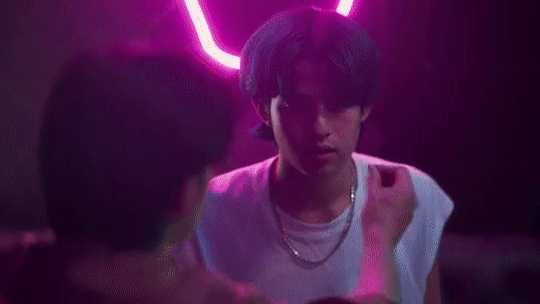
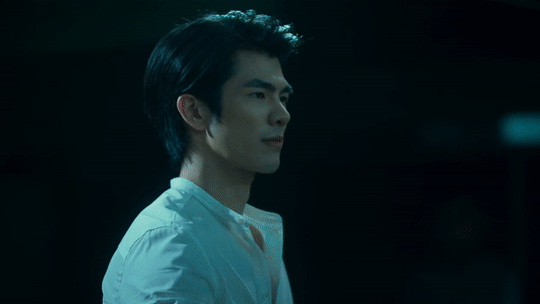
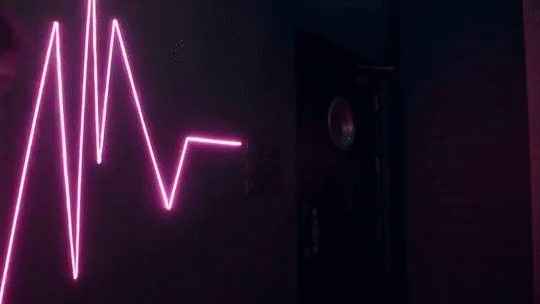

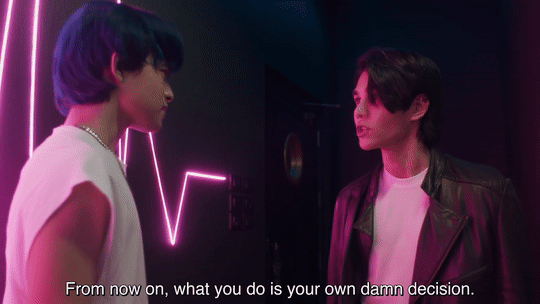

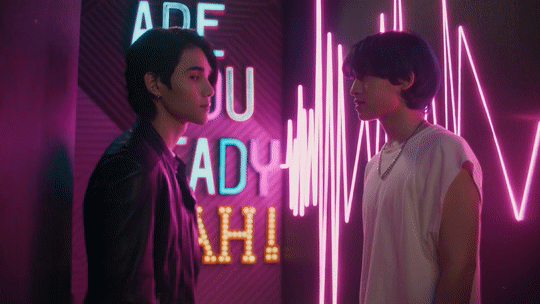


holding it together until they’re alone
Two Brothers, One Personality
#porsche kittisawasd#porschay kittisawasd#kittisawasd family#kinnporsche#kimchay#kinnporsche the series#kinnporsche the series meta#kittisawasd brothers and their masks#everyone goes on about the theerapanyakul masks and deceptions#but these two have been doing it their whole lives too#only thing that's really different is WHAT they're hiding#and why#these boys grew up hiding their distress from each other#because they didn't want to worry each other#porsche hiding his mafia job#and chay hiding his secret boyfriend and heartbreak#is just the latest culmination#of a lifetime of trying not to worry the other one#joke's on them that's ALSO a great mask to survive in the mafia#they never really broke the habit either#by the end of the show#chay still only cries when he's alone and no one can see him#and porsche still puts on a strong front in front of everybody except kinn
840 notes
·
View notes
Text
"...and I'm the one who loves you"
Kinnporsche vs Call Me By Your Name meta
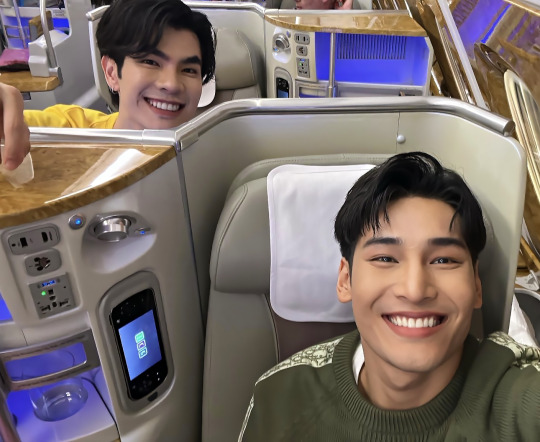
I was thinking maybe I should write this meta. After all, if I compared Mile’s fave LGBTQ film to KPTS, shouldn’t I do the same for Apo’s? Seems only fair. But honestly, CMBYN is so intensely personal for me, since I'm both gay and Jewish, that I wasn’t convinced I can do it. Then back in June, Mileapo chose to fly to Paris while wearing each other’s fave color, so here we are.
“We may be Jews of discretion”
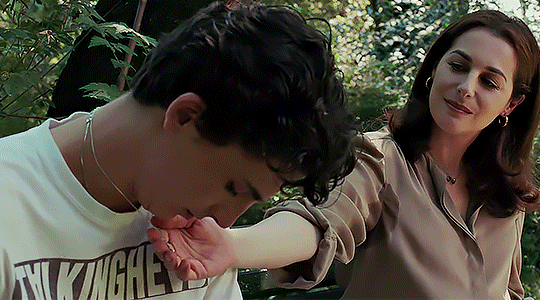
The reason why CMBYN is so personal to me is not just that its protagonist is queer and also happens to be Jewish. It’s that the similarities are pointed out between being a member of both of these marginalized groups. Not for every single member of these groups, of course, but many times if you’re Jewish or if you’re queer, it is possible to hide. Not if you’re a religious Jew, with clothes and customs that give you away. Not if you’re a guy whose manners are seen as “sissy” and homophobes decide you’re gay before you even identify as such. Not if you’re a Jew with a very obvious Jewish last name or ethnic look. Not if you’re a queer person who happens to fit someone’s idea of what gay people are like. But under certain circumstances, there is a possibility to hide, to be invisible. And that existence isn’t easy either, when an antisemitic or homophobic environment can make it sometimes feel impossible to do anything other than hide, feeling like a target even when you do. You have to force yourself to act a certain gender-conforming way, or hide your Star of David necklace, relinquish some of the things that you want and need, or only get to have them in secret. You just have to be silent. Keep your voice as a member of one of these groups to yourself. Keep your authentic self unseen. Know that otherwise, there will be much to lose. That you can never be sure of your safety. Hide. Remain disconnected from your community. Stash away your truest self. Bury it so deep that sometimes you end up even lying to yourself. Pay the terrible price of being unknown, unseen, unaccepted, internalizing that so many people’s love for you is conditional, dependent on a part of you being erased by fear and eventually self-loathing. This is what it means to be Jews of discretion, as Elio’s mom puts it (not telling her son to remove his Star of David necklace, but still covering it with her palm). To be Queers of discretion, as we all start in a heteronormative society. As Elio starts and eventually refuses to be (in the book), and as Oliver is, outside the bubble the Perlmans provide him for one summer.

It’s ironic Oliver will remain trapped in the closet of socially-sanctioned heterosexual marriage, when he's the one who teaches Elio that it’s alright to be openly and proudly Jewish. Oliver’s an exception. He and the Perlmans are the only Jews in this Italian town, and Elio’s family are very secretive about their Jewish identity. They keep it in the closet along with Elio’s Star of David necklace. But Oliver isn’t ashamed, he doesn’t keep being Jewish hidden away. He wears it literally around his neck for all to see. It’s brave and inspiring, which gets Elio to realize there can be another way to be Jewish. At the same time, Oliver never pressures him to adopt this path. In fact, Oliver doesn’t consciously try to do anything regarding Elio’s Jewish identity. He’s just being himself. But in being free in this regard, he inspires Elio and allows him to find within himself the courage and the freedom to choose to do the same, to dig up that Star of David necklace, and to be more openly himself.
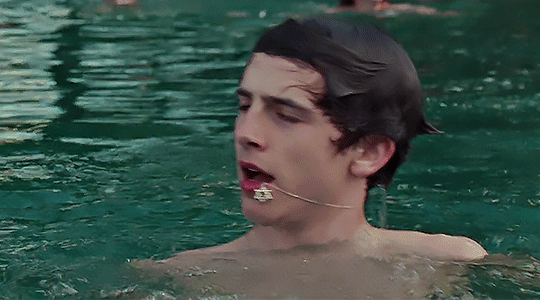
It interlaces their identities, as Elio refers to them in the book as “brothers in the desert.” A reminder of their Jewish ancestors wandering around the desert and eventually coming out of it, reaching the Promised Land. Together. This is also a reminder that in very similar ways, embracing your marginalized identity can give you strength. It can give you roots from which to grow, a community to be a part of, a connection to something greater than yourself. It can give you confidence that some may not accept you, but you are not as lost as it may seem.
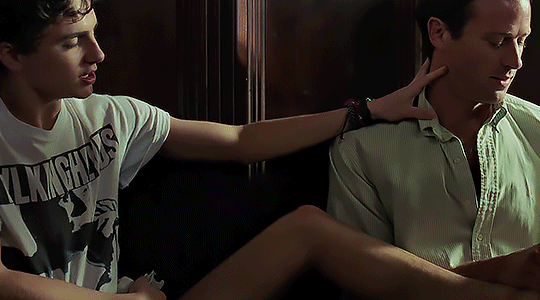
At the end of the day, even if Oliver wasn’t able to choose to live an openly queer life himself, it’s implied that the courage he gave Elio to be openly Jewish, to realize he does have options as a member of a marginalized group, also allowed this young man to eventually be open and honest about his bisexual identity.

In my Brokeback Mountain vs KPTS meta I went into the details of how we know that Kinn and Porsche live in a world in which homophobia exists, but in their personal circle and experiences, it is almost nonexistent. Kinn is definitely not a “queer of discretion.” We don't find out right away, but it’s made clear that he’s not afraid of people finding out he’s gay as he tells a gorgeous woman hitting on him in the bathroom that she’s not his type in ep 102, doesn’t try for a second to hide his boy toy in 103, and then it’s explicitly confirmed by Pete that Kinn’s openly gay in 104. Porsche, who didn’t realize he’s bisexual until he met Kinn, needs a bit more time, though not much more. He recalls they kissed shortly after he discovers Kinn’s gay (nice touch there, showing how that man is Porsche's sexual awakening on several levels) in ep 104, and by the start of 108, he’s ready to tell two meaningful people (his surrogate mother and his best friend) about it. Yes, Jom guessed it first, but Porsche could have denied or lied in reaction, he could have chosen the closet, even temporarily while he was still processing his own newly found identity. He does to a degree, he asks Yok not to tell anyone else because he’s never dated a guy before. But he doesn’t keep his truth hidden from her and Jom.

Yet, I would argue that Porsche’s nervousness over anyone else knowing that he’s dating Kinn qualifies in a sense. He does get embarrassed about his lack of experience in dating a man. He does have a moment of hesitation as they walk out of the bathroom in the cafe during their 108 date and the two girls who walk by glare at them. He even lets go of Kinn’s hand for a moment (and remember that the oath “I’ll never let go of his hand” will become meaningful between them). Then later Porsche gets shy about exchanging kisses in the cafe courtyard as they’re leaving, too. He’s also the one who told Kinn not to share their news to begin with. So for a short while, even if they’re not fully in the closet as queer men, they do keep their relationship stuffed in there, becoming lovers of discretion, in part due to the challenges of homophobia.

Don’t get me wrong, I think they have some obvious fun with the secrecy as well, especially at first, when they enjoy teasing each other sexually in front of everyone else, and without anyone realizing what's going on. But I also believe it takes a certain toll on them. Having to monitor a part of yourself, watch what you can and can’t say, regulate your behavior, limit your freedom, it always comes with a price. For Kinn and Porsche, I think that is most pronounced when Tawan returns. Of course this man isn’t clueless to the fact that they are together even if they’re not open about it, but the fact that they’re hiding it is something he can easily exploit. He can try and get closer to Kinn without Porsche being able to do or say anything about it publicly. He can undermine Porsche’s confidence, get under his skin, without Kinn being able to reassure him in public that he has nothing to be afraid of. By the time Porsche does get some alone time with his boyfriend, instead of having an open, honest talk about it, he’s busy with seduction techniques, because Tawan has already got to him with those mind games. And at the same time, he can get to Kinn, too! Tawan can manipulate the situation to make it seem as if Porsche is a traitor without them being able to talk openly about this. Porsche is not free to say in front of everyone that their love means too much to him to betray what they have, while Kinn's POV might be influenced by the question of, “If you don’t want to be open about us, if you can lie about it, what else can you be deceitful about?”
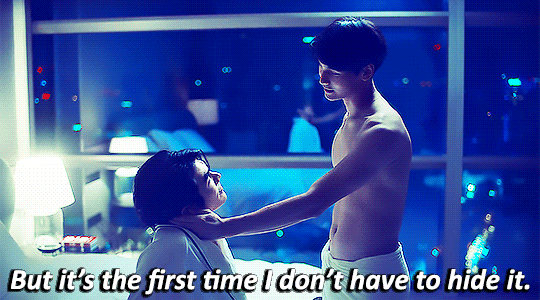
It’s a testament to their bond that despite all this, they manage to come out on the other side with their trust in each other renewed. Maybe even deepened, now that they’ve gone through their first trial of fire, and learned that their love is stronger than they might have previously thought. They started out as lovers of discretion, but after this trial, they get to step into the light, together.
"And I will call you by mine"
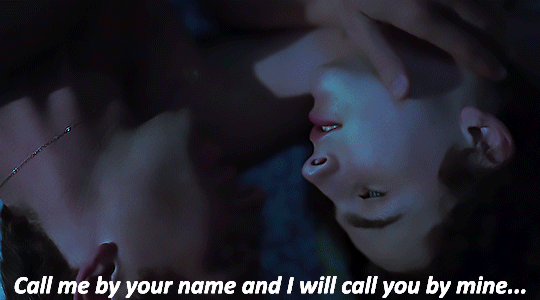
One of my favorite themes in CMBYN is the melding of identities that occurs when two people are not just lovers, they’re also soulmates. A part of one becomes a part of the other. We first witness this when Oliver and Elio finally give in to their physical, intellectual and emotional attraction to each other by having sex. “Call me by your name,” Oliver asks in Elio's bed, which is his for the summer, “and I will call you by mine” (the reversal in identities is also reflected in the upside down shot of this scene). I love that immediate promise of reciprocity. I love that there’s already some level on which he recognizes that they’re so much more alike than some might think.

Calling one by the other’s name also expresses how they’ve changed each other. They’ve made each other braver, happier and more honest. Not just between the two of them. They each allowed the other one to understand himself better and be more honest with his own self. And that changes them. Oliver after Elio is not the same person he was, neither would Elio ever be the same person. He was changed by Oliver, and he was bound to, in order to become himself. To be loved by someone who helps you be a better version of yourself means to be changed, because that better version would never come to be expressed without that person.

So the exchange of names isn’t just a sweet moment between two men who just had sex for the first time. It’s a profound sharing of who they are, tying themselves to each other. It also becomes a part of their love language. Their verbal code for belonging to each other. At a certain point in the book, many years after their affair is over, Oliver is visiting the Perlman parents, and they call Elio, putting the two former lovers on the phone line. Oliver has done what he was expected to do, he married a wife and had kids with her. Elio wonders what’s left between them and what they are to one another, as he knows that what they shared was so powerful, he himself could never forget it. Has Oliver? Elio tests it by speaking his own name into the telephone. He waits all tense for the response. When it’s given, it’s not the one he was hoping for. But towards the end of the book, after a few more years have passed, they meet once more. Elio’s father has passed away. Oliver is divorced. They talk, and as Elio offers to lead them down one of the paths they used to take, Oliver reveals that there’s no need for it. “I’m like you,” he says. “I remember everything.” But Elio doesn’t trust this, not yet. He tests Oliver again by using his own name. If Oliver turns around, if he reciprocates the gesture, then he does remember. Then... then they still belong to each other, and they still have a chance. (no spoilers from me, but if you want to know whether or not soulmates Oliver and Elio do make it, you might wanna check out the sequel, Find Me)

The way I see Kinn and Porsche, they belong to each other in this exact manner. They make each other better, softer, happier and more fulfilled. They had both denied themselves a loving relationship, Kinn over Tawan’s past betrayal and Porsche for the sake of providing for Chay. But once they start one, it becomes evident it’s what they both wanted all along. The contentment that they find in each other is clear in scenes like the date, when Kinn simply gets to be himself, soft and cute, teasing and affectionate, or the one where Porsche just lies on Kinn’s chest, his hair being caressed by his boyfriend, their physical contact comforting and enveloping him.

And since they belong to each other, it is also expressed in a similar exchange of identities, much like Oliver and Elio. When they start their date in 108 by going into the stalls of the cafe’s bathrooms, they are shedding their regular attires, the ones that represent what they’re supposed to be in the eyes of the world, their social roles as mafia boss and his bodyguard. In their place, they put on “civilian” clothes. Except they don’t put on their own, they each wear the other man’s casual outfit from ep 105 (thank you so much to the wonderful @moerusai who helped confirm this for me).

I'm gonna return to Oliver and Elio for a second to mention that after their first night together, after they exchanged names their names, there's another touch of swapping identities, where Oliver is wiping the cum on his chest (most likely Elio's) with his shirt. It's the one he wore on the day of arrival, and Elio asks for it when it's time for Oliver to depart. It's a symbol that even when they'll be separated, they'll still be connected, a part of their identities still swapped. So imagine how much I screamed when Kinn and Porsche exchanged theirs!

This is such an important moment for Kinn and Porsche. They’re setting themselves free in a sense, by allowing themselves to take on something of the other man. They get to be playful together, there is no pretense between them, this isn’t in a space that belongs to just one of them, like Kinn’s bedroom or Porsche’s house, they get to shed something of their identity and take on a piece of the other in a way that lets them be more themselves. Choosing the other man’s outfit is also another way of testifying to how much they like each other, but also that it’s specifically the other one that helps to set them free, to make them a better, happier version of themselves.
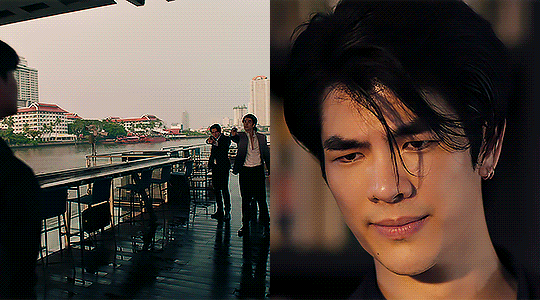
And of course, along the show we'll see them switching between their socially assigned roles, too. Porsche is Kinn’s bodyguard, yet twice along the series, it will be Kinn who steps into danger in order to save Porsche's life from a bullet (eps 103 and 106). Similarly, by the end of the show, in order to be together, Porsche will accept the role of a mafia prince himself, coming to lead the minor family in a role parallel to Kinn's. But this will only happen after the ultimate reversal in positions between them. If in ep 101 we meet cold-blooded killer Kinn, if he had all the power with an entire gang of armed men at his back while he pulled a gun on a very confident and determined Porsche (whose name Kinn originally didn't even know) to extort him, by ep 114 it will be Porsche (confused and lost after everything he has ever known about himself, his family and his life since the accident turned out to be false) who has his gun pointed, while Kinn will be standing there, trying to stop Porsche from becoming a cold-blooded killer, Kinn's hand alone on the right side of the screen conveying his helplessness. They're both stripped naked of all of their defenses and who they used to be, and Kinn's begging for their love and trust to somehow win by using Porsche's name. You can even see the contrast in the way the shots of these stand-offs are framed.

Where identities get intermingled between lovers, names take on a special significance. There is an intimacy in their use, especially as a plea on its own. It's akin to saying, “Can you hear? This is me. I am asking you this and hoping that you'll listen, even when I have no other arguments, simply because of who you are to me and who I am to you.” That’s what Elio does when he uses his own name with Oliver, he is pleading with him to remember what they had, to admit to remembering it, which is to admit to how much it meant to both of them. That’s also what Porsche does when Kinn gives the order to arrest him. He’s no longer arguing facts or his own innocence. He simply pleads with Kinn to remember who they are to each other. If he does, that would be enough to make it all right. While it doesn't work, by the last ep of the show, when it will be Kinn begging Porsche using his name, it finally will.
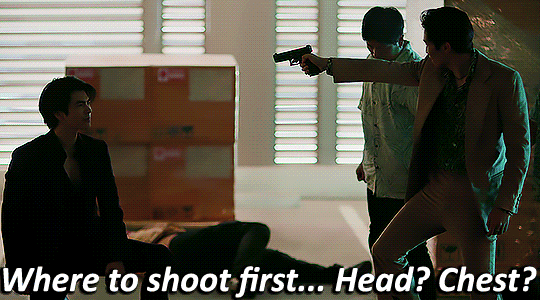
Another way their identities meld together which always gets to me is that in 114, we have another instance showing us that Kinn and Porsche are no longer separate beings, and that one is no longer whole without the other. When Vegas wants to shoot Kinn, something that he confesses he has dreamt about for years, he recognizes that he can’t simply shoot Kinn himself. To hurt him in his most vulnerable spot, Vegas would have to shoot Porsche. In fact, as Vegan points his gun to one organ after another in Kinn’s body and names them, he then points to Porsche’s chest, identifying Porsche’s heart as Kinn's. Their bodies physically are no longer separated. The deep meaning of this observation is later confirmed in the very same ep, when we see Kinn celebrating his and Porsche’s union by preparing a drink that he has named “Kinn’s heart” and presenting it for Porsche to drink.
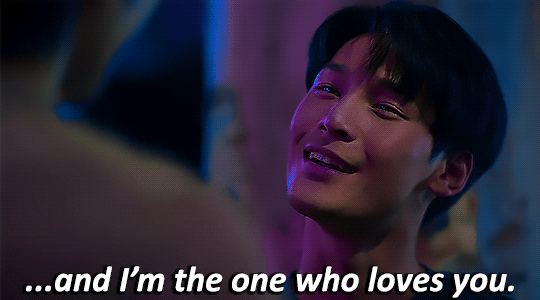
Lastly, we have one of the most important moments in the show in ep 112, when Kinn is asking for another chance and a new start from Porsche underneath the red lanterns (which have traditionally been used in ceremonies of marriage and birth. Yes, both of those feel very appropriate for the significance of this moment, especially as this is happening in the spot where they first met, where their relationship was born). He doesn’t really need to, not when he was just there for Porsche, who was contemplating killing a family man for revenge. Kinn was willing to have his back no matter what choice Porsche made, but he made it more bearable for his boyfriend to spare the man’s life by offering him encouragement and comfort afterwards. Telling Porsche that he did the right thing and Kinn’s proud of him. It’s only after this that Porsche can put the gun away. Would the Kinn who ruled ruthlessly before they met say such a thing? The guy who shot an accountant in ep 101 point blank for a much smaller sin than killing someone’s parents, without even blinking? But Kinn wants them to be sincere with each other, and he knows that starts with asking forgiveness for the things he held back himself. And Porsche accepts his plea for a fresh start through agreeing to play along with Kinn’s re-introduction. If when they first met, Porsche wouldn’t even tell this man his real name, if this scene reminds us that they both lied to and distrusted each other, now it’s a completely different story. Porsche gives his real name, and offers a description of them that says everything about where they are. “I’m the one you love... and I’m the one who loves you.” He presents them as perfect reflections of each other, wording it in a way that would be true if either man said it.
What’s in a peach?
One of my favorite scenes in CMBYN is probably its most controversial one. Yes, the peach scene. In case you’ve only seen the movie, not read the book, I have to start by mentioning that they don’t play out in exactly the same way in both versions. Let me start by saying a few words about the original book version.
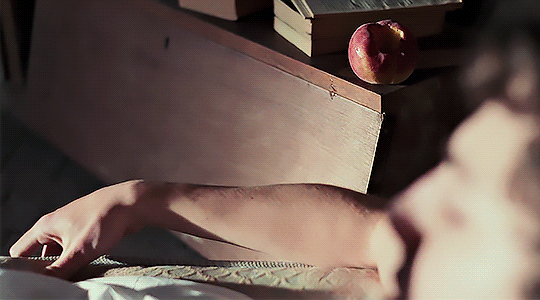
In the book, Elio fantasized about being seen and wanted, he’s thinking of both the girl he had lost his virginity with and Oliver, who he first slept with the night before. So the fantasy is linked to his bisexual awakening. He starts playing it out with a peach he’s been holding, fucking it and tying the act in his mind to a Greek mythology tale he’s making up. It’s about lovers who are kept apart by an unaccepting society, they were turned by the gods into peaches, and this kind of a sexual act is their only possibility of a future reunion, hundreds of years down the line. This tale is a foreshadowing of Elio and Oliver’s eventual separation and the question of whether they would get to reunite. In Elio's mind, it connected this sexual act to shame and to society’s judgment. He also recognizes that fucking a peach is “a crazy thing” once he’s done. With his semen inside the fruit, Elio ends up identifying it with himself, with what he must have looked like the night before, when Oliver came inside him. He becomes ashamed of himself, of his sexuality and of his affair with Oliver, of what society will make of it.

Elio falls asleep and is later awoken when Oliver comes into his room to fulfill the promise made that morning, to give him a blow job. Oliver starts to do exactly that and as he feels the taste left by the peach, it prompts a confession out of Elio. He also ends up asking, “I’m sick, aren’t I?” Oliver reassures him with words that he’s not, then with actions, deciding to eat the peach with the semen still inside. Elio can’t handle that. He tries to stop Oliver, and in a parallel, he first tries words. This only prompts Oliver to confess how much he has wanted Elio this whole time instead of continuing to play it cool. He makes himself vulnerable to make sure the guy he fell for doesn’t feel bad about a passion they both share. So Elio resorts to actions. He physically lunges himself forward. But Oliver catches him and won’t be stopped. He goes ahead and eats the inseminated peach while staring intensely at Elio, making sure he’s watching this. It’s such an impactful moment that Elio describes love making as not going “that far.” At that moment, since the semen is in Oliver’s mouth, Elio says it’s “more his than mine.” It’s another instance when they’re melding into each other. It's a perfect act of love and acceptance which makes even sex pale in comparison. Elio was ashamed and the peach took on the symbolism of everything that he dislikes about himself, everything that he can’t yet accept. And Oliver, by insisting on eating it, is basically telling him, “There’s no part of you that’s too shameful, not even the parts of you that you think are the most disgusting ones, nothing that is too ugly for me to accept and contain.”

Elio gets it. He’s so loved in that moment, so accepted, that it becomes overwhelming and he starts to cry. He recognizes the immeasurable kindness in this act and, in a sense, this is how he reciprocates it, by allowing himself to be vulnerable in front of Oliver, too. In the book, this is where I knew that Oliver and Elio might still go through guilt and confusion, shame and separation, because love is not a magic solution for everything, but they ARE soulmates. They are bonded by this deep understanding and acceptance of each other, as well as a willingness to do what the other one needs even when it means they're making themselves vulnerable. And every deepening of their relationship is built on the foundation of that moment, while their separation happens in spite of it.
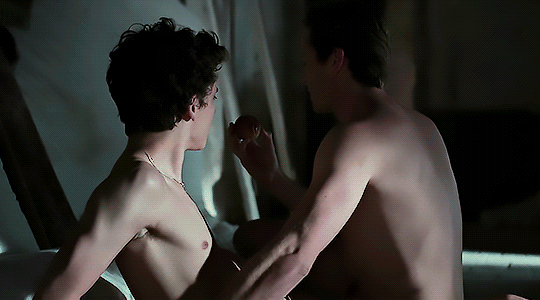
I cannot express enough how much I love the peach scene in the book. I'll forever be sad that the movie dilutes it by having Elio succeed in stopping Oliver from eating the peach. They also added some dialogue that doesn't match the original intention, but even this one change with the peach makes a huge difference IMO, and I also believe it changes the meaning behind Elio's crying, as if it comes from a place of shame, when it's actually the exact opposite. I can only assume they didn’t want to upset viewers too much with this scene's so-called vulgarity. A man almost eating his boyfriend’s seed is better than him actually doing it, right? But really, that’s giving into (in real life!) exactly the kind of societal shame that Elio was feeling. The whole scene becomes... weaker at best.

So when I compare this scene to KPTS, please allow me to do it with the original, more powerful meaning in mind. It was that scene that popped into my head when I first watched 108. Porsche and Kinn are waking up after FINALLY having sex they KNOW they both feel the same, where they are so incredibly joyful about being in sync, and the first thing they do as they wake up... they disgust each other with their morning breaths. This might be played for humor, it’s definitely not as dramatic and intense as the CMBYN scene, but I think it conveys the same idea. Kinn and Porsche are now in a place where they love each other enough to be able to accept even the gross parts the other one has, desire the other person anyway and kiss him passionately (morning breath and all), and find joy together while basking in this complete sense of mutual acceptance and adoration.

It might still not sound like anything too meaningful, but this is going to be a part of the foundation for what will come later. When their reality unravels, when Kinn is forced to admit his family had manipulated Porsche into accepting his job as a bodyguard, when Porsche is at a low point and considers murdering a man at point blank for supposedly having killed his parents, when they discover that their two families are actually linked through murder and betrayal, that they themselves are not exactly who they always believed themselves to be, Kinn and Porsche will also find that despite everything, their love for each other allows them to contain all of these ugly realities and continue to trust each other, continue to build a life together. Like Oliver and Elio, they’re soulmates, too.

Here, I might add a little note that connects this part of the meta with the previous one. When Kinn and Porsche exchange clothes (and thus, identities) in 108, they choose to wear the clothes they did in 105. That was one of their more painful moments. They’re no longer deluding themselves that they don’t want the other guy, but they’re still hurting each other. Wearing those clothes, out of all possible outfits, signifies an awareness of the other man’s ability to wound them, an awareness of the ugly parts, of the pain that is entailed in every relationship, of the vulnerability they’re bringing upon themselves by abandoning the simple sex life they had before, and choosing to go on a date together despite and together with all of that. They’re containing each other with the parts of the other man capable of hurting them, and still choose to love him. Not out of blindness, they love each other with eyes wide open, they accept the worse parts of the other one, and in doing so, they allow him and themselves to be their best, happiest, most fulfilled version.
To love as a choice

Oliver and Elio are soulmates because at a very specific moment in time, they choose to love each other, with the worst parts of themselves included. They end up separated after their summer together, but before that, they choose each other in the most profound way. Which means that even once they’re separated, even though they hurt, even though they remember each other with longing, they wouldn’t erase their love even if they could. That's what the last shot of the movie is about, feeling the pain fully and still not regretting anything, knowing that it was worth it.
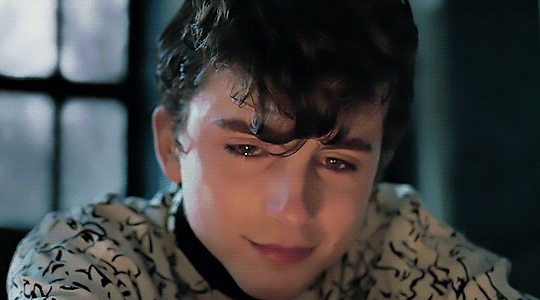
Do Kinn and Porsche feel the same? I believe that like Oliver and Elio, they very much choose each other. Kinn and Porsche are not together only because they have to, it's because they want to. They might have had a moment where they tried to move on from each other and couldn't, but it’s not the end of their tale. In 105, they try to get past what has started to develop between them by having sex with someone else, with a person who represents their usual type up until then (for Porsche it’s a woman, for Kinn it’s an easy to control boy toy) only to discover that they can’t. There’s something about the other man that makes it evident that the kind of people they used to hook up with cannot satisfy Kinn and Porsche's needs anymore. But that doesn’t mean that they run straight back to each other. Their next interaction will actually involve a loaded gun being held between them, a fitting metaphor for how they still don’t trust each other and they’re each still incredibly upset with the other guy.

It takes Kinn choosing to come after Porsche, making an effort to be less demanding and entitled, as well as making himself vulnerable in 106 for that to change. It also takes Porsche choosing to listen to Kinn in 105 instead of kicking him out, making himself vulnerable by angrily pointing out that Kinn never cared about him (exposing the fact that Porsche wanted him to) and being willing to look and really see who Kinn is behind his mafia prince mask. Which is why by the end of that ep, they choose each other. Kinn chooses to let Porsche go, give him his freedom and a chance at his dream and a normal life. Porsche chooses to return to Kinn despite being set free from the mafia life he despises. Porsche chooses to sacrifice his hand for Kinn (let’s not forget that without a hand, he can’t know if he’d be able to provide for himself and for Chay, maybe his most important goal in life, if he even survives amputating himself out in nature, away from any medical help), while Kinn chooses to take a bullet for him. After this ep, no matter what happens to them, no matter how bad things get, I think they know that this love and devotion is the best thing that has happened to them and they could never want to let go of each other, they would always hold each other’s hand, they would love the other man with eyes wide open and out of their own free will. They go through their own pain and suffering, the ending of the show implies that with Korn still scheming, there will be more in store for them in the future, but it's also clear that just like Oliver and Elio, Kinn and Porsche would never regret choosing and loving each other. They too know that it's worth it. Like I said... Soulmates.
(Thank you for reading! For more of my Kinnporsche/Mileapo posts, click here. For all of my Kinnporsche meta on AO3, click here)
#mkp#mile phakphum#mile phakphum romsaithong#phakphum romsaithong#apo nattawin#apo nattawin wattanagitiphat#nattawin wattanagitiphat#kinnporsche#kinnporsche cast#kinnporsche the cast#kpts cast#kpts the cast#kinnporschedaily#mileapodaily#kinnporche the series#kpts#kinnporsche meta#kpts meta#kinnporsche the series meta
49 notes
·
View notes
Text
So, I want to share something that’s been sitting in my brain since KinnPorsche the Series aired. I’m a person who loves seeing colors and their meanings in the media I consume, as well as seeing how those colors connect to characters and become like a calling card for them. And oh boy does KPTS do that often. And one thing I’ve seen over and over again is that when Pete is on screen, – and somehow Vegas is involved – the color green appears.
In either lighting, clothing, and/or background items/decorations. And yes, green lighting is shown in scenes where neither is involved, or just Vegas, but it’s most common with Pete.
The meal that Vegas barges in on at the main home where Pete is present? Green lighting.
Pete in the car with the condoms and Vegas? Green lighting.
Pete snooping in the minor home and getting caught? Green shutters and Vegas in a green robe.
Pete being tortured? Green lighting.
Pete in the safe house? Green lighting.
Pete afterwards in the tub after his escape? Green lighting.
Vegas when he is pretty much confessing to Porsche about his feelings for Pete and swearing he’ll keep him safe no matter what? Green silk shirt.
Now, I know what you’re saying, “This sounds almost like Vegas is the green color.” Or “Well green can mean this thing, so it’s not really connected to Pete.” And yes, you are probably correct, but this is where it gets interesting. (Also this is just my personal take. So anything else is also valid.)
We know how Pete is as a character, right? Well look at what we find when we look at the color green:
“Green is a very down–to–earth color. It can represent new beginnings and growth. It also signifies renewal and abundance. Alternatively, green can also represent envy or jealousy, and a lack of experience. In spiritual terms, the color green implies beginnings, new growth, vibrant health, and other ideas connected with life, rebirth, and renewal.”
Now, does some of that sound familiar? These are all things that you can tie to Pete. Down-to-earth, lack of experience (you all know), beginnings, new growth, rebirth/renewal, and even envy or jealousy (from what I’ve seen people talk about how Pete felt about Porsche at certain points.) These are parts of Pete and his journey throughout KPTS.
Even more interesting is when you look into green in terms of love:
“What does the color green mean in love?
Green is the color of the heart chakra, symbolizing love to others, forgiveness, compassion, understanding, transformation, warmth, sharing, sincerity and devotion.”
Now tell me that isn’t Pete’s love for others, but especially Vegas. That’s basically how Pete loves Vegas down to the letter in the series.
But let’s also look at Vegas while we’re here. So I know most of the fandom pins Vegas’ color as red (I do too) and when you go back and look at certain scenes (the torture and safe house scenes for example) you see both colors. And the show almost always seems to add the red once Vegas enters, and even frames them accordingly to their colors. So of course we have to look at that.
Now what’s interesting is red and green are opposites, yet complimentary colors on the color wheel. One could almost say two things that are the same yet different. (Yes, I am implying Vegas and Pete being similar, yet different right now.) But let’s take an even closer look at the colors and what they represent when compared to each other:
“Red is a color of vigor and energy. It represents passion, urgency and grabs instant attention. It can also cause you to feel hunger, which is why it is used in food and beverage logos.” Now who does this sound like? Grabs instant attention, vigor and energy, but above all else causing you to feel hunger?
“Since red is the color of blood, it has historically been associated with sacrifice, danger, and courage. Modern surveys in Europe and the United States show red is also the color most commonly associated with heat, activity, passion, sexuality, anger, love, and joy.” And now we bring blood, danger, sacrifice, passion, sexuality, anger, love, and joy into the mix as well? Seems pretty spot on with Vegas.
“Green, on the other hand, is a color of peace, rejuvenation, nature, cleanliness, and fertility.” So when compared to red, green is its opposite: bringing peace, a rebirth of some sorts, and cleanliness (like washing away the sins of your past perhaps?). But also note how some similarities still are there.
Now one last look at the colors. I feel like this one is the big kicker for these two, and really sells Pete as green, and Vegas as Red: “Green speaks to our desire to foster understanding and acceptance between people and to see the potential value and goodness of each person. Green does not represent the color of love on the level of passion between two people. Throughout history, red has been the color of passion, romance, and sexual energy.”
That to me is Pete. If nothing else, that is Pete as a character and how you see him in his time at the safe house. He tries over and over to understand Vegas, see the value and goodness in him, as well as acceptance for who he is and of his past. You can even boil it down to just how Pete is as a person and how he loves/cares for people in general.
And when we look at the love on a romantic or just simply passion level, we see how Vegas and Pete are different. Vegas – like most people in his family – loves people to obsession. Once he loves you, he will do anything for you. He cannot and will not let anything or anyone harm Pete. He brings the intensity and sexual energy that we never really get from Pete. Pete loves in a more nurturing and compassionate way. Vegas comes in like a fire, whereas Pete comes in like a gentle rain on a summer day.
But when they two come together (look at me bringing things back around again) they compliment each other, and both take from one another. Pete learns to be more rage and heat. Finds that hunger and passion that he never had before. Finds the love and sexuality that he never explored or was aware of in his life.
Vegas cools down some of his heat and rage, and brings in the compassion and understanding of others (even if we only get to see it briefly with people like Porsche and Pete.) And we even see him entering his rebirth right before he gets shot and afterwards. Him finding that peace and devotion. That warmth and his own love that he never had before.
Red and green are two colors that work perfectly (again, in my opinion) for these two as “their colors”, but also to give us more depth and insight into two characters who didn’t get as much time and development as others. Complimentary, yet opposites. The same, yet different. Two people that you would never expect to come together, yet are soulmates through and through for one another.
One ruby heart, now speckled with beautiful emeralds. One lush and green heart, now blooming beautiful red blossoms.
#KPTS meta#KinnPorsche the series meta#color meta#character meta#vegaspete#vegas theerapanyakul#pete phongsakorn#pete saengtham#kinnporsche the series#venus speaks#Legit hope I tagged stuff correctly because this is something I worked hard on to try and make sense#yes this legit has been in my brain since the series hit the air#I have always thought green was Pete’s color and red was Vegas’#so imagine my surprise when I never saw it mentioned and here we are#and I know green may mean something else just as red does/will but again this is my own personal opinion/thoughts#long post
44 notes
·
View notes
Text
VegasPete and the Escape from Freedom
This is simply a character analysis of Vegas and Pete from KinnPorsche the Series through the framework provided in Erich Fromm’s Escape from Freedom in Chapter 5 section Authoritarianism.
Freedom and Anxiety
In the tradition of psychoanalysis, we work with the assumption that people have motivations and beliefs that are unconscious and that primary bonds (i.e., bonds a child has with parents) are severed in the individualization process and the result is the facing of the world as a separate entity that experiences the inherent grief of separateness and powerlessness (see e.g., Lacan).
This anxiety of freedom is also at the basis of existentialist thought shared by, for instance, Kierkegaard, de Beauvoir, and Sartre. For Camus, the focus is on the realization of the absurdity of the human condition that is searching for meaning in an uncaring universe: The need to understand life that cannot be fulfilled - a question without an answer. In Fromm’s words this is expressed that people are “free in a negative sense: alone with themselves and confronting an alien, hostile world.”
In the face of this existential anguish people either realize themselves in the world or panic in the face of its weight and try to escape. One way of escape, offered by Fromm, is the adoption of the authoritarian attitude to find a quick fix: The giving up of one’s self and independence, and fusing the self with another self or something else to compensate for the lacking and loneliness of the self at the root of the anxiety. In other words, the escape is backwards by trying to replace the primary bonds of childhood dependence on parents with secondary, but similar, bonds. This, however, is not ever truly possible (Lacan again), and such attempts will perpetuate a cycle of neuroticism.
2. Sado-masochism
At the core of such escape attempts are sadistic and masochistic tendencies, since both attempts at escaping the unbearable aloneness. Masochistic and sadistic tendencies are always found in the same characters, since they fulfill the same need. Hence, sado-masochism. However, the extent to which each is present oscillates, but people can be characterized mostly as either one over the other. Thus, they both coexist and conflict with each other in a struggle to want to feel independent and strong and the feelings of powerlessness and insignificance found at the core of these characters.
While sadism and masochism both seek completion from symbiosis of the self with the self of another in complete dependence, the difference is that in masochistic tendencies one abandons the self for another, whereas in sadistic tendencies the parts of the self lacking are “filled” by absorbing another via dominance. Indeed, masochism abandons the self and sadism attempts to fill it with something that will fix what is perceived as a lack. Moreover, both sadism and masochism entail two forms that are always found together in individuals: bodily and moral. Moral sado-masochism is found in correlation with the sexual, bodily sado-masochism, in which the “perversions” are the sexual expression of a masochistic character.
A little Freud reading here as a treat: He thought that people have the options of either destroying themselves or others if they fail to amalgamate destructiveness in sex. So get kinky or kill or get killed I guess.
a. Masochism
Being two sides of the same coin, and always found in the same individual, let us still characterize them separately beginning with masochism. Masochism stems from feelings of inferiority, powerlessness, and insignificance. Masochists often make themselves weak and do not master things. They destroy all their egos aim towards. They try to eliminate the burden of their anxiety: the self. In the physical sense, this can culminate in hurting oneself and making oneself suffer. In this quest to make oneself small and disappear in the face of unbearable aloneness, suicidal fantasy is the final solution to solving the posed problem.
The other side of masochism in addition to the extermination of the self is the desire for capability and power. However, it is seen as absent from the self and is found in becoming a part of an external, bigger, more powerful whole, such as other people, institutions, god, or some virtue or conscience. Thus, masochists attempt to embody something powerful while abandoning the self. With such external sources of authority and power, the masochistic person becomes free of making choices, and free from having to decide the fate of himself, free from doubt about who he is - they are determined by the greater whole he has become part of.
b. Sadism
Sadistic tendencies are found in the same type of characters that embody masochistic tendencies. Just like the core of masochism is not to get hurt but to submit the self away, the core of sadism is not to hurt but to dominate and control others; To become God, while masochists want to find something to be their God. However, we must make a distinction over wielding power and dominating others here: Power has a twofold meaning, potency and domination. Thus, will to power is not inherently the will to dominate at the root of sadism.
While masochists rationalize their character by seeing their feelings of inferiority as based on truth and evidence, sadists also rationalize their feelings in ways such as “I’m wonderful, so it makes sense for me to control over people” and more extreme ones, such as “by striking first I’m defending myself,” but these are rationalizations - not the essences of these behaviors. This is common in parent-children relationships in which it is assumed the parent knows better and stunts the child’s attempts at individualization and self search. This results in children like these becoming afraid of “love”, since they conceptualize it as being blocked from their own freedom.
c. The Authoritarian
Masochists depend on external power structures, such as powerful people or institutions. They do not assert themselves or do what they want, but tide their actions over to factual or alleged orders of outside forces. Thus, the sado-masochistic character can be found in the authoritarian character, who admires authority, submits to it, but at the same time wants authority for himself and others to subject to it. For instance in finding power in institutions and joining them at the willing sacrifice of the self.
A characteristic of the authoritarian is that he loves beyond anything being submitted to fate, the conviction that life is determined by powers outside of the self. His heroism is the submitting to fate, not trying to change it. He sees himself to lack an offensive potency that he can find in being subservient to another, strong power, like in joining an organization to assert the power he sees as himself lacking.
For the authoritarian, equality does not exist - the word is empty for him for it is outside his emotional experience. The world is composed of people with and without power. The irony in this is that these powers are completely subjective, which makes authority relationships dissolve when the authoritarian perceives weakness in their powerful subject. This often then turns into an antagonistic relationship of the authoritarian to the entity he had been attached to previously. Thus, those with mostly sadistic tendencies are dependent on their subjects, masochists, while dependent on a subject, will find themselves abandoning their conceptualized sources of power when they see them as weak and adopt an antagonistic relationship to perceived weakness.
d. The Emotional Child
A milder form of the same need for dependency and abandonment of the self that does not necessarily take on sado-masochistic character is the need for a “magical helper”. For those in need of a magic helper, their whole lives are in relation to a power outside themselves driven by the inability to stand alone and express their individual potentialities. In the lack of reliance on the self, they need an external source of protection, guidance, and help that will never leave them. This can take on a personified form in a god or another person, but the need for the magical helper exists a priori before the personification of one. However, the embodiment of these qualities is a “magic helper” that is imbued with magical qualities. The one requiring the helper hopes to get everything one expects from life through the magical helper instead of their own actions.
Often, the one in need of the helper becomes dependent himself on the helper in the sense that he asks himself questions in striving for the helper to not leave like “would he be displeased with this?”, “agree with that?”, “scold me for that?”. Moreover, in its dependant nature, for him his life becomes about manipulating the helper not to leave, how to make the helper do what one wants, how to make the helper responsible for the things one ought to be responsible for oneself. In essence, these people are not emotionally mature enough to realize their selves and look for an authority figure like a parent. Indeed, the need for a magic helper often stems from parents stunting children's strivings for individuality and the building of the concept of the self. For these people, there is no feeling or thought not colored by the need to manipulate the helper, there is truly no act that is spontaneous and free.
3. Vegas and Pete
a. Pete
Masochistic tendencies in Pete are fairly obvious, but he expresses them explicitly in their core in the moment of vulnerability when he asks for Vegas to kill him and the self-harm that preceded it: ““Kill me”, “I got nothing, not even my humanity left”, “I’ve always been useless - I don’t exist - I have no feelings”. These are the active mental elimination of the self in this masochistic drive and they end in the ultimatum of suicidal ideation.
Pete is a capable bodyguard, but does not seem ambitious in it - he seems content with occupying a position of power and not mastering it in the way masochists make themselves weak and do not aim to succeed, and yet try to find external sources of power, like, well, the mafia. By being in the mob, Pete can embody the power and strength masochists strive for while becoming free of deciding who he is and making choices: someone tells him to kill and main, Pete kills and maims. Someone tells him to watch series he doesn’t like? Pete watches. He has power and yet he does not exist.
However, these masochistic drives are always a temporary solution and compulsory neuroticism, which is why you see its metastable nature between this abandonment of the self and the drive to power. For instance, right after making himself nothing in opening up to Vegas, he changes his tone: “I’m a human, I have feelings”, “I’m not for emotional projection” and punches the fuck out of Vegas and goes back to the main family - his source of power. This conflict is present when he questions himself about having had sex with Vegas: “I don’t like it”, he slaps himself and asks, “Then why didn’t I say no?”, with which he acknowledges he made the choice to have sex and that in saying yes he raises for himself the question: “So did I like it?”. Masochism is pleasure in abandoning the self so it makes sense he’s feeling both well and true.
However, with the masochism there’s always the sadism and Pete is a manifestation of the authoritarian attitude: He joined the mafia, to which he submits and from which he gains himself authority and the possibility to dominate others by the way of finding from it the offensive capabilities he seems himself to lack otherwise. He even offers his solution to Vegas when he asks Vegas to give himself to Korn and submit to the main family: If Vegas is so struggling with being seen as powerless and pointless, then he can also become powerful through the abandonment of the self and embodying that external power without having to fight for it. For Pete there are no good or bad guys, there is only power and the lack of it, so it does not matter where it comes from - unlike for Vegas.
From the authoritarian attitude we find the highest virtue of being submitted to fate, to the conviction of a life determined by the powers outside of the self in Pete’s emotions: “I just live in the present,” “What I’m feeling, that’s all I think about,” and “You have to accept who you are” imply that Pete submits to his whims instead of engaging in an agentic manner in his own life. No wonder he feels like an animal without a sense of self: for Pete, his immediate feelings are the guiding fate that tells him the truth.
Since authoritarians are prone to changing their sources of power into more attractive ones when they perceive weakness in previous ones, it raises the question whether Pete was always attracted to that power in Vegas and the minor family: Their outright violence and brutality in comparison to what appear bureaucrats in comparison. Did a change occur in his subjective view of the main family, Kinn and Tankhun, as becoming weaker when he saw Vegas use power over him? These are not necessarily rational sentiments, and often rooted in childhood, so Vegas using a power like Pete’s father used to have over him and Pete understanding violence as power, it would make sense for him to register that as power. However, Pete demonstrates he is an independent self apart from his father in that he knows his fathers opinion of him does not matter - there is no enmeshment.
b. Vegas
The sado-masochistic character is obvious in Vegas as well. The weakness, powerlessness and feelings of insignificance are, funnily enough, very Freudian in their emergence: “Who’s weak?” when Pete calls him sensitive, him calling Pete “acting weak” when Pete is having his breakdown. He is extremely sensitive to being seen as weak and in the authoritarian manner blames it all on external circumstances: He’s weak because he is in the minor family and everything he feels due to that is caused by and the fault of the main family: “Isn’t my life like this because of them?”
When he is presented by Pete with Pete’s solution to the anguish of freedom (joining the main family), Vegas is faced with the concept of having a choice, which threatens his understanding of his self as completely dictated by outside forces. This directs him to look at the weakness he feels and Vegas is a character who cannot face himself. Having his gaze directed into himself instead of the outside world, he gets instantly reactive and that sadistic tendency kicks into basically overdrive and turns into abusing Pete.
Clearly, despite the instances of self-harm and self-berating, the sadistic character is more prevalent in Vegas: He dominates and controls people to create that symbiosis of the self with another and by absorbing the targets of his sadism, they “fill” his sense of self. The perfect example, outside the obvious, is the way he attempts to dominate both sexually (proxyfucking) and emotionally Kinn’s love interests, because by doing so he can gain something over Kinn for his self’s fulfillment. Moreover, according to Fromm, it is quintessential of the sadistic character to try to drive their object away, but when it becomes a real threat, they break down and plead, because they are dependent on them: Pete with the knife.
What makes Vegas’ case particularly interesting is the enmeshment with his father. His situation is, to me, clear narcissistic abuse, in the sense that he has always been a tool and an extension of his father and never his own person. When you’re an extension of a parent instead of seen as an actual human, the mind has no option except to perceive the self through the Other. You feel as if you are how your parent sees you and how you make the parent look. This does not enable the development of a separate sense of self, this type of self keeps looking out for attachments and other selves to see itself through. Because of this, the sadistic character is the natural option: The self is not abandoned, but in constant connection and augmentation and in view to the other selves it attaches to. You can only abandon the dependent self masochistically as a joint entity with another: You merge the self with the subject and abandon that by sadism.
The disruption of the developmental process is what makes Vegas an emotional child. The undeveloped self looks for the magical helper in its object, which can be seen first in his father when he asks: “What do you want me to do?”. However, naturally, there is the conflict and struggle of the self trying to form in these circumstances and the will to power when he tries to create the self “hidden” from his father in his plans hidden from his father. And later on, this helper becomes personified in Pete. This becomes clear when he begins to look for Pete for the responsibility and confirmation of his experiences. When after they have had sex, Vegas says “I thought I was a freak” and expects Pete to make himself (Vegas) okay for him. He goes to Pete for emotional regulation after getting slapped by his dad. And most importantly, everything for Vegas becomes about not losing Pete after the personification has happened: He looks worried when Pete reacts “wrong” to Vegas calling him a fool, he begs for Pete not to leave, he goes after him. Every action becomes about having access to the magic helper, both in manipulating the personification as well as constant self-scrutiny over how Vegas is being perceived by Pete.
c. VegasPete
In the instance when Pete tells Vegas it’s “his choice” to choose his loyalties, we see the main difference in these characters in whether it is masochism or sadism that comes out on top. Vegas is incapable of looking at himself and thus he cannot have a sense of a self to abandon, he cannot find his self-hatred and thus tries to fill it from the outside compulsively. Pete, on the other hand, has a sense of self, he knows how he feels and admits it to himself, “I’ve always been worthless”, thus he has a whole self to abandon and thus, masochism becomes possible for him in a way it is not possible for Vegas to abandon a self he does not have.
Moreover, this stability of the self sets them apart in the progression in the same journey: Recovering from parental abuse. Pete still feels worthless and alone, but he has gained a sense of self. Vegas feels worthless and alone, but is making haphazard attachments with his self. In this sense, Pete knows where Vegas’ mind is, his mental state, because he has likely been there himself at some point. He knows what is emotional projection - the enmeshment - and calls Vegas out for it when he sees it, while Vegas likely does not know what that is, for him the world simply exists like that and there’s no special concept to call it.
The “it’s not fun if you don’t give in” part could be seen from the sadistic perspective in wanting to have confirmation of the power of the object of sadism: Confirmation that they want you and you have that power over them. However, that’s not the case since Vegas is evidently surprised by Pete’s kiss, and thus, he was expecting something else: rejection. He just talked about how everything leaves him. Here his masochistic side comes into play and he wants confirmation for his trauma: he’s trying to make Pete leave after Pete initially stayed. He wants to confirm his worthlessness and loneliness, but when that doesn’t happen, we witness Vegas’ immediate and complete infatuation with Pete: Pete becomes the personified magical helper.
Vegas would honestly rather die than be without Pete, he thinks it would be best if he was killed by Pete and maybe even is waiting for Pete to kill him. Pete, on the other hand, could find other places to submit to and has that power over Vegas. Pete would have been completely okay not seeing Vegas after the safehouse, even accounting for the conflict he felt over it. He did tell Vegas to get out of his life, and would have let him leave. Vegas needs his personified magical helper, while Pete needs a place for losing himself and gaining external power.
Furthermore, Pete has emotional maturity Vegas does not have, and a clear as day view into where Vegas is at and is capable of pulling those strings should he want to. This has implications in that there is all possibility for Pete to come to see Vegas as lacking and powerless in which he would come to abandon Vegas as a submission project. On the other hand, he can find a place to turn to sadism and “fill” his own self with the power he once saw in the minor family and Vegas himself by dominating Vegas with his emotional advantage.
Frequently sado-masochism is confounded with love. Self-denial for the sake of another person and the surrender are seen as great love. However, this “love” is only just masochistic yearning and rooted in a symbiotic need of another person involved and the process of personification of a magic helper is often what people refer to as “falling in love” often accompanied with sexual desires. According to Fromm, actual love is the passionate affirmation and active relatedness to the essence of a particular person, the union with another person on the basis of independence and integrity. If love is based on equality and freedom - then love and masochism are opposites. Thus, what is present is not love.
And so I have managed to make myself sad over this ship. The possibilities for Pete to become abusive or continue his own abuse. Vegas finding someone to stay only out of masochistic yearning and not love and never getting to experience his self as a whole. Possibilities for Pete never overcoming his slavery to his whims and feelings. Even his choice at the end to follow Vegas could be seen as something he saw himself forced to do because of his feelings. Even Vegas’ declaration of Pete being the most important thing for him being rooted in a need for a magical helper.
But that’s not what is compelling about this ship and these characters, because we get to see something beyond these compulses. And compulses are exactly what they are. While they can overtake so many aspects of these characters, no one is only a caricature of an archetype and everyone has needs of belonging and being respected that are yearned for. Compulses only sabotage these attempts, but accepting the self is always in the realm of possibilities. So it is also for Vegas and Pete.
In the tub, being tended to by Porsche and later eating noodles, we see Pete grapple with conflicting emotions. He’s reflecting on himself and what he had experienced was too raw to talk about. When he chose to leave the main family, maybe he was choosing to abandon himself, but he is making a choice. He chose after reflecting on how he was feeling. He chose Vegas who had just lost everything, his power. Pete made a choice away from institutional power and into a power he saw crumble before his eyes when Vegas laid lifeless on the ground.
Vegas is capable of care. We see it with Macau, his hedgehog, when he was cooking for Pete. There was no indication of being worried about how the Other was perceiving him, he didn’t appear to be concerned about what Pete would think of his cooking - he just wanted to do something nice. He wanted to do something. And when he reached Pete behind the bar after his escape he recognized Pete as a separate person for the first time: “You know why.” It’s possible he was projecting his own feelings of needing and dependency, but at least to me, he seemed to consider Pete first. Vegas seemed to recognize and understand what Pete meant with emotional projection. This is a smart, broken man, and fast to learn.
Thus, even with all the obstacles laid before them, there’s hope. There’s the possibility to choose to escape into freedom. Possibilities for them to choose themselves and each other, and, somewhere along the way, gain confidence in their own selves so much that they no longer depend on each other, but choose to rely on each other. And if we were to listen to Mr. Freud on it, that’s going to be all the more likely if they have a healthier, confined to bed, outlet for the yearnings to be free of the self in moments of relief in each other.
#kinnporsche the series#kinnporsche#kinnporsche meta#kinnporsche the series meta#vegas theerapanyakul#pete saengtham#vegaspete#vegaspete meta#vegas theerapanyakul meta#pete saengtham meta
15 notes
·
View notes
Text
Is BL Being Overly Influenced by Modern Western Romance Tropes?
Short answer: No. anyways, in the following essay I will explain that James Cameron is a weeb...
(okay fine~~ lets actually do this)
TLDR: discussing what media globalization is, how fandom can distill it down to only American/European cinema, showcasing how a lot of current BL is influenced by countries within it's own proximity and NOT "the west" but each other, also James Cameron is still a weeb
I had seen a post that basically proposited that BL was being influenced by modern western romance tropes and had used things like omegaverse and mafia settings as an example. I found this, in a word, fucking annoying (oh, two words I guess) because it's micro-xenophobic to me.
It positions western - and really what we mean by this is American/European countries, we're not talking about South American countries are we? - cinema as the central breadbasket of all cinema in and of itself. Inherently, all following cinema must be in some way, shape, or form, influenced by American/European standards, and as such America/European countries are directly responsible for cinema everywhere else, and these places - namely non-white countries - do not influence each other, nor have their own histories in regards to storytelling or cinema and do not, in turn, also influence American/European film making either.
Now like, do I think all of that~~ is intentionally malicious thinking on behalf of folks in fandom? No, so chill out.
I do, however, think a lot of it is birthed from simple ignorance and growing up in an environment where ~The West~ is propagated to be central, individual, and exceptional as opposed to the monolith of "Asia" - by which we mean China, Korea, Japan don't we? How often in discussions of Asian countries is Iran, India, or Saudi Arabia brought up even tho they are all Asian countries? - or the monolith that is South America - in which some folks might believe regions like the Caribbean and/or Central America belong to, but nope there both North America.
Anyway, what we're talking about here is the concept of "media globalization":
"The production, distribution, and consumption of media products on a global scale, facilitating the exchange and diffusion of ideas cross-culturally." (source)
"The media industry is, in many ways, perfect for globalization, or the spread of global trade without regard for traditional political borders. [...] the low marginal costs of media mean that reaching a wider market creates much larger profit margins for media companies. [...] Media is largely a cultural product, and the transfer of such a product is likely to have an influence on the recipient’s culture." (source)
Typically when I see fandom discussing what falls under MG the topic is usually focused on how "the west" is influencing Thai/Korean/Chinese/Japanese media.
Enter, Pit Babe.
Surely Pit Babe was influenced by Supernatural right? Omegaverse is huge in the west - love it, hate it, meh it - it originated in the west - specifically via Supernatural after all.
Nah.
Omegaverse has been popular in Japan and China for almost a decade, if not longer. The earliest omegaverse manga I can think of is Pendulum: Juujin Omegaverse by Hana Hasumi which was released in 2015, almost a decade ago.

(what if you added furries into omegaverse? WHAT IF?? - Japan)
There's countless popular omegaverse manga too, and the dynamics only moderately resemble the ones we're familiar with in the west. Juujin is part omegaverse and part furry/beastmen - the alphas are all beastmen the omegas are humans - while something like Ookami-kun Is Not Scary only slightly resembles omegaverse dynamics as a hybrid series - beastmen are really popular in Japan in part b/c of historical mythology (you see the combination of romantic Beastmen and Japanese culture & folklore in Mamoru Hosoda's work The Boy and the Beast and Wolf Children).
Megumi & Tsugumi (2018) is so popular they're an official English edition published by VIZ's imprint SuBlime and that's a straight up omegaverse story.

(look at the omega symbol on the cover loud and proud baby)
So if Pit Babe was influenced by anything, it certainly wasn't "the west" it was Japan, Korea and China. Because those countries have a thriving omegaverse sub-genre going and have had such for 10 plus years now. Supernatural is popular in Japan, yes, and that may be where Japan and Japanese fans originally found omegaverse as a fictional sub-genre.
HOWEVER
Japanese fans took the sub-genre, bent it, played with it, and evolved it into their own thing. As such, other countries in their proximity, like Thailand, China, and Korea who read BL and GL manga, found it and were like "hey, we wanna play too!"

(is that an omegaverse yuri novel I spy?? yes, yes it is)
When I watched the Red Peafowl trailer, it had more in common with Kinnporsche, History: Trapped, along with films and shows like: Jet Li's The Enforcer, and Fist of Legend, Donnie Yen's Flash Point, Raging Fire, and Kung Fu Jungle, Han Dong-wook's The Worst of Evil, Kim Jin-Min's My Name, Lee Chung-hyeon's The Ballerina, Baik's Believer & Believer 2, Yoshie Kaoruhara's KeixYaku, popular Don Lee films The Gangster, the Cop and the Devil and Unstoppable alongside BL manga like Honto Yajuu and Bi No Isu (probably one of the most well known yazuka manga to date).
youtube
youtube
youtube
Like, we're seeing a rise in mafia based BLs and people think that's because of "western influence" and not the absolute insane success of kinnporsche??? Especially in countries like China, Korea, Taiwan, Philippines and other Asian countries???
Mafia films and gang shows aren't even that popular here in America/Europe; don't get me wrong, they still get made and exist, but the last full length film was The Irishman which did not make it's budget back, and while Power is still on-going it's not a smash hit either. The heyday of Breaking Bad, The Sopranos, The Wire, Goodfellas, and Scarface are long gone. And if you've watched any those shows or films they have very little in common with Kei x Yaku, Kinnporsche, or Red Peafowl in tone, or style.
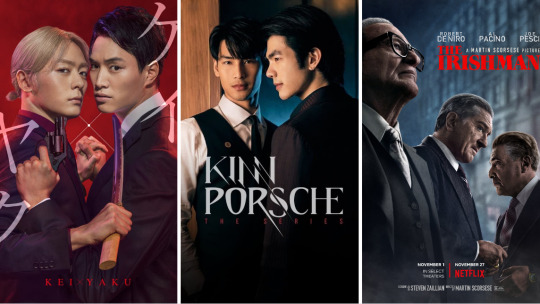
(who knew martin just wanted to make his al pacino/robert de niro fanfic come to life all these years?)
Another example, The Sign, which is clearly taking inspiration from Chinese costume dramas: Ashes of Love, Fairy and Devil, White Snake (and it's many adaptions), Guardian, & Ying Yang Master Dream of Eternity. Alongside Hong Kong and Korean cop and romance shows like Tale of the Nine-Tailed, Hotel Del Luna, Director Who Buys Me Dinner, First Love, Again, and previously mentioned cop dramas.
youtube
youtube
youtube
Like, I know y'all don't think Twins is influenced by, what, American sports classic Angels in the Outfield?? Gridiron Gang?? Rocky?? Nah that shit is inspired by the popularity of sports manga like Haikyuu!!, Slam Dunk, Prince of Tennis (which even has a Chinese drama adaption), and the like. And also probably History 2, & Not Me but I'm like 87% sure Twins is just Haikyuu fanfic.
So like, does this mean that there's NO history in which American and European cinema influenced these countries? What, no, obviously that's not true, American/European totally have had media influence on countries like Korea, Japan, etc.
Astro Boy by Osamu Tezuka considered "the father of manga" was inspired by Walt Disney's work on Bambi. Another more recent and prominent example is director Yeon Sang-ho and his film Train to Busan.
"And it was Snyder’s movie [Dawn of the Dead, 2004], not the 1978 original, that filmmaker Yeon Sang-ho recalled as his first encounter with the undead. “That was when I started my interest in zombies,” Yeon said, in an email interview through a translator from South Korea. Even today, he added, “it’s the most memorable and intense zombie movie I’ve ever seen.”" (source)
HOWEVER, the global influence doesn't stop there. It's not a one-way street. Yeon Sang-Ho was inspired by Zack Synder's Dawn of the Dead, a remake of George Romero's own work, but Yeon Sang-Ho's work has inspired countless Korean film makers to make their own zombie media; following Train to Busan there's been: Kingdom (2019 - current), All of Us Are Dead (2022), Zombie Detective (2020), Zombieverse (2023), Alive (2020), Rampant (2018).
And hey, wouldn't you know it now we're starting to see more zombie media coming out of places like Japan (Zom 100 the manga, movie, and anime) and High School of the Dead.
Do you know what Domundi's series Zombivor (2023, pilot trailer only) reminds me of? It's NOT The Walking Dead (which is the only relevant zombie media America has created in the last decade) it's Korea's All of Us Are Dead (2022). Comparing the trailers, the settings, the tone, it's clear where Zombivor is pulling inspiration from: Korean zombie cinema. NOT American zombie cinema.
youtube
youtube
youtube
In fact a lot of Domundi's shows - Cutie Pie, Middleman's Love, Naughty Babe, Bed Friend - are all very clearly inspired by Korean filmmaking, specifically that of romantic kdramas from the 2016 - 2020 era. Not always in story, but rather in technique.
This is media globalization. It's not simply ~The West~ influencing non-American/European countries but countries who are often more close in terms of: proximity, culture, and trade are going to have more influence on each other.
It is far more likely that Aoftion (Naughty Babe, Cutie Pie, Zombivor) was influenced by watching Train to Busan, All of Us Are Dead, and other Korean zombie shows and films than a single episode of Walking Dead.
My point isn't that this goes one way only, but rather it is very literally a global thing. This includes American and European film makers being influenced by non-American and European cinema.
Martin Scorsese, Steven Spielberg, Darren Aronofsky, Christopher Nolan, the Wachowski sisters, George Lucas and James Cameron have all been influenced by Japanese film making, especially the works of Akira Kurosawa, Satoshi Kon, and Mamoru Oshii.
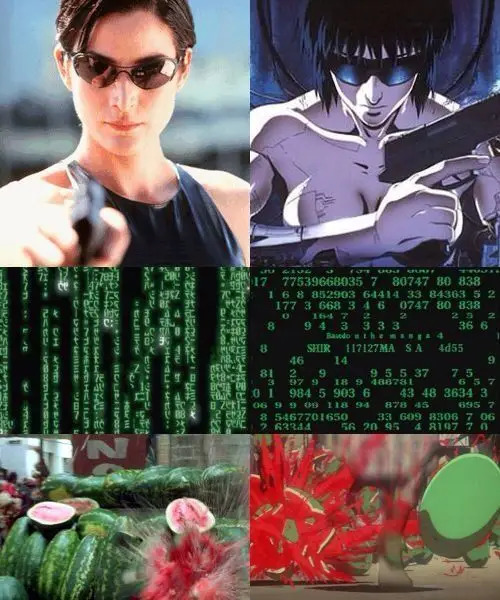
John Wick's entire gun-fu sub-genre is heavily influenced by classic Hong Kong action films, specifically John Woo films. Legend of Korra, The Boondocks, Voltron, Young Justice, My Adventures with Superman are all obviously inspired by Japanese anime but animated by a Korean animation studio (Studio Mir). Beyond that, the rise in adult animated dramas like Castlevania, Critical Role Vox Machina, and Invincible to name a few are very clearly taking inspiration from anime in terms of style. The weebs that were watching Adult Swim's Inuyasha, Bleach, and Dragon Ball Z have grown up and are now working in Hollywood.
Okay so like, what's the point of all this? What's the issue? Since American/European cinema does influence et all cinema does any of this really matter?
YES.
I take contention with this line of thinking because it centers "the west" and our supposed individual importance way to much. Declaring definitively that "BL is being influenced by western tropes" and then including tropes, narratives, and film making styles that aren't inherently western and actually have major roots in the cinema of various Asian countries, removes the existence of individual history these countries have which are rich, varied, and nuanced. It removes the "global" part of globalization by declaring "the globe" is really just America and Europe.
It distills these countries down to static places that only exist when American/European audiences discover them.
BL doesn't exist in a vacuum you can trace the development of Korean BL to the development of Korean het dramas almost to a T. You can also trace their development to the queer history of each country and how Thailand interacts culturally with China, Japan, Korea, etc and vice versa. It also ignores the history of these countries influencing American cinema as well. Don't mistake "the globe" for only your sphere of experience.
Anyway James Cameron is a damn weeb y'all have a good night.
Check out other posts in the series:
Film Making? In My BL? - The Sign ep01 Edition | Aspect Ratio in Love for Love's Sake | Cinematography in My BL - Our Skyy2 vs kinnporsche, 2gether vs semantic error, 1000 Stars vs The Sign | How The Sign Uses CGI | Is BL Being Overly Influenced by Modern Western Romance Tropes?
[like these posts? drop me a couple pennies on ko-fi]
#kinnporsche#pit babe the series#the sign the series#twins the series#red peafowl the series#domundi#gmmtv#chaos pikachu speaks#fucking a this was an entire essay#i should drop a ko-fi link cause good god damn#chaos pikachu metas#Youtube#pikachu's bl film series
291 notes
·
View notes
Text
kim's jackets: a meta post
so I don't know if anyone has made a post discussing this, I apologize if someone already has, but i was just thinking about the costume choices for Kim, and specifically the use of jackets, or the lack thereof.
almost every single scene he appears in, he is wearing some form of outer layer, often leather, sometimes denim, and a couple other fabrics, mostly sturdy/thick material.
this could just be a fashion choice, but also... these jackets are used like armor – not physicially, but as a representation of him sheilding/armoring himself emotionally, and that becomes more apparent when we look at the few scenes when he is not wearing a jacket.
I think the first one is when he first goes to Chay’s house.
to an extent, obviously, he's still very closed off, but it's also the first time he starts to open up to Chay. it's during this scene that Chay and his affection for Kim start to get under Kim's skin and affect him.

If I remember correctly, we don't see Kim without a jacket again until he's back at Chay's house, post confession.
his jacket is thrown aside, and he is left completely vulnerable, both emotionally and physically. His emotions have gotten the best of him, and he's let his guard down, and it's bad.

Chay gets taken right in front of him.

which leads to:
kim storming the warehouse with his heart on his nonexistent sleeve.
this is the most exposed we see him in the entirety of the show. he is so focused on protecting Chay that for a moment he doesn't even consider how much of himself and his feelings he is putting on display. (the next time he sees Chay, he's back in leather and running away).

similar to the warehouse scene, the next time we see him without a jacket is during the hum bar fight scene.
again, fighting for Chay like this exposes him and his feelings. he is desperate and angry and unguarded.

the next jacketless scene is....
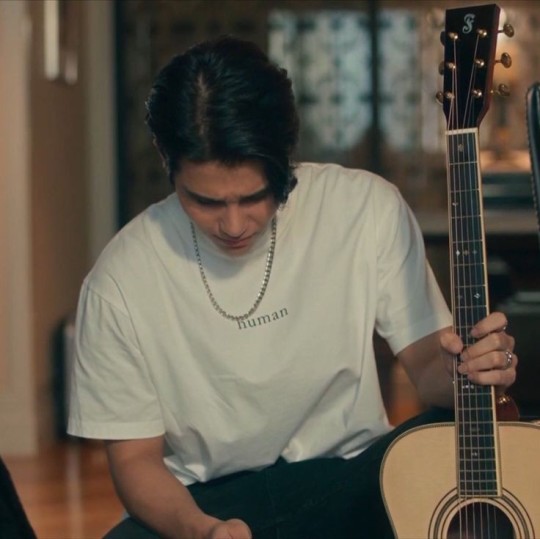
the "human" shirt, when his feelings for Chay and the consequences of his actions come crashing down on him. he is alone in his apartment and he has no armor left to hide behind.
and that brings us to our last scene: why don't you stay
he is, in the only way he knows how, baring his heart and feelings for Chay. it's a very intentional display of having his defenses down and letting himself be vulnerable, and letting Chay see his vulnerability.

Chay is the only person who's granted this type of honesty from Kim.
even in scenes when Kim is alone in his own apartment working on his investigations, he's wearing jackets. it's only when he's thinking about chay, reaching out to him or protecting him that we ever see Kim without his armor
pt 2
#kimchay#kim theerapanyakul#kinnporsche#kpts#kpts meta#benji talks#a lot#porchay kittisawasd#kinnporsche the series#benji is overanalyzing everything about kim again help#kim kimhan
246 notes
·
View notes
Text
I think the best part of KinnPorsche, and it really comes to mind with this latest episode, is that every character thinks they’re in a different genre and it’s the funniest thing watching it clash with the reality.
Kinn is just living his best rom-com life where he falls for his sassy but kind assistant bodyguard that he can no longer live with out.
Porsche is basically a YA novel where he falls for his sexy morally ambiguous love interest who’s secretly sweet but *gasp* his past has come to haunt him!
Pete thinks he’s in a dark psychological thriller where he must battle his inner demons and brooding but hot captor to maintain his humanity but it threatens to over take him at any moment as he is torn between his newly found dark desires and the reputation he prides himself on.
Vegas acts like he’s in gothic bodice ripper novel where his entire world becomes the kind, empathic heroine Pete and he will do anything to keep him to himself and Pete is going to help him overcome the truama of his past with his love.
Kim sees himself in this brooding noir style detective film where he must uncover the dark past of his family but oh no he finds himself falling for the pure and sweet ingénue Chay and must wrestle with the dangerous life he leads and the mission he’s devoted himself to and the love of his life
Porchay thought he’s living his Wattpad dream life where he meets his idol and gains his respect as he tutors him and they slowly develop a sweet friendship that turns into a heartfelt romance
They really demonstrate how all the characters are protagonists of their own story, and that’s how they make their decisions, based on the assumptions on the world around them. They think they know the story their in, and that’s the role they have taken, but the tragedy and the complications of these relationships is that they aren’t in a single genre story. They’re people, achingly human people, interacting with other complex people and what is salvation for one is a damnation for the other.
They aren’t in any specific genre (you know, beyond on the whole mafia thing) and that’s where the miscommunication happens, that’s how the drama unfolds, that’s how all these different romances keep missing each other, because they’re all operating on different wavelengths based on the story they think *THEY’RE* in and not stopping to really consider the other perspective.
It’s absolutely hilarious, it’s terribly tragic, it’s utterly beautiful and performed so well by the writers and the actors.
#kinnporsche the series#KinnPorsche#kimchay#vegaspete#they’re all unhinged disasters#i love them so much#i’m obsessed#porsche my beloved#kinnporsche meta#kinda at least#just my little ramble/thought/theory#i just love how they are all the main character of their own story#and it really shows how they think they’re in a different show then the one they’re in#in the end it’s a mafia bl series#but they’re in denial about the inevitablity of it lmao#eventually they’re going to have to reconcile it#and I for one can not wait#kinnporsche episode 13
5K notes
·
View notes
Text
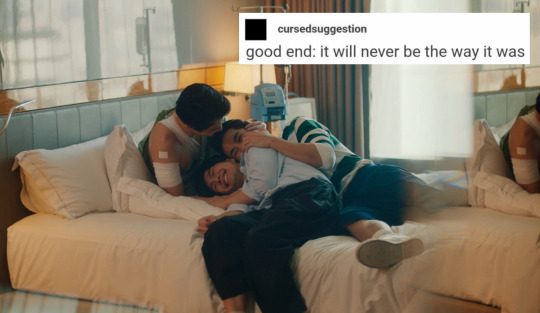
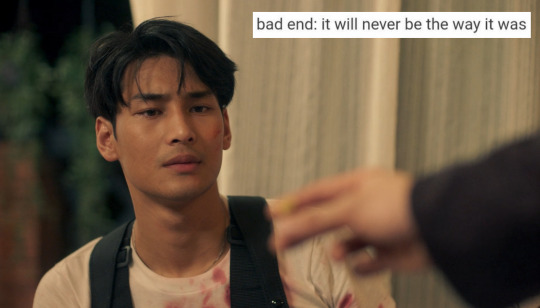
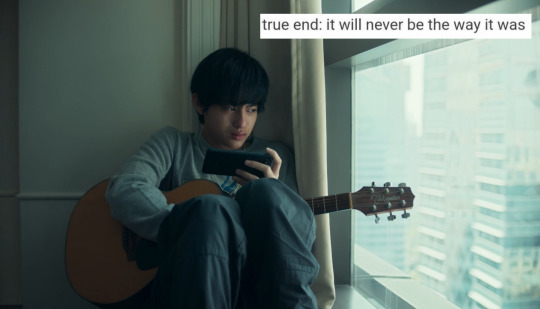
#kprewatch2023#my personal interpretation of the final episode in - how else could it be - text post format#real life (a.k.a. work) finally caught up with me so there won't be a whole rewatch edition today#but I'll definitely make one :)#so please enjoy this meta meme instead 😌#kinnporsche the series#kinnporsche ep. 14#kinnporsche + text post#vegaspetemacau#porchay kittisawasd#kinn × porsche#thai bl
500 notes
·
View notes
Text
Meta Doc for Man Suang & Shine
I have no chill.
I'm starting a meta doc for Man Suang and Shine. I wouldn't have done it for a movie alone, but since we're getting a series, well, game on.
There isn't enough content to make it worth sharing yet, but I just want y'all to know I'm on it and this is happening.
The dragon rises.
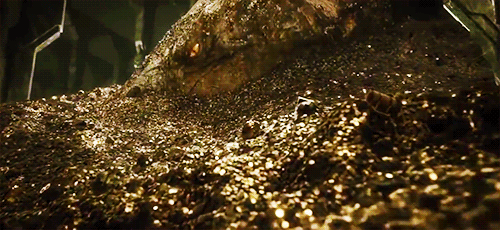
Not familiar with the KinnPorsche Meta Doc? It's nearly 1,000 collected links of Tumblr meta thoughts about KinnPorsche the Series, gathered from dozens upon dozens of fans during the time the show was airing.
#man suang#shine#shine the series#meta doc#mileapo#kinnporsche cast#more great meta to come#because I'm a glutton for punishment#kinnporsche#kinnporsche meta doc
172 notes
·
View notes
Text
Turtles Catches Up With Old GMMTV: KinnPorsche, and Analyzing the KP Cultural Zeitgeist Edition (Part 1)
[What’s going on here? After joining Tumblr and discovering Thai BLs through KinnPorsche in 2022, I began watching GMMTV’s new offerings -- and realized that I had a lot of history to catch up on, to appreciate the more recent works that I was delving into. From tropes to BL frameworks, what we’re watching now hails from somewhere, and I’m learning about Thai BL's history through what I’m calling the Old GMMTV Challenge (OGMMTVC). Starting with recommendations from @absolutebl on their post regarding how GMMTV is correcting for its mistakes with its shows today, I’ve made an expansive list to get me through a condensed history of essential/classic/significant Thai BLs produced by GMMTV and many other BL studios. My watchlist, pasted below, lists what I’ve watched and what’s upcoming, along with the reviews I’ve written so far. Today, in a two-part series, I offer my thoughts on KinnPorsche, my very first Thai BL, and the impact that I think KP has had on the Thai BL industry since 2022.]
Hot damn! It has been a MINUTE since my last OGMMTVC review, so I'm glad to be back. I've been very much looking forward to writing my thoughts about my recent KinnPorsche rewatch: I enjoyed this ENTIRE process, especially in regards to watching KinnPorsche in the context and chronology of past Thai BLs, and man, did I ever see KP WAYYYYY differently than the first time I watched it.
Why's that? Welp -- *KinnPorsche was my first-ever Thai BL*. (Not my first BL drama ever; that award goes to the GOAT, Kinou Nani Tabeta?/What Did You Eat Yesterday?)
But when I joined Tumblr officially in July 2022, just about a year and a half ago (in the heat of passionately obsessing over Old Fashion Cupcake), my dash was awash, AWASH, in KP posts. AWASH.
I had no idea what the fuck the algorithm was telling me.
I went into KinnPorsche knowing absolutely NOTHING about Thai BL tropes, the history of the genre, the actors in the roles, what made KP so innovative by way of its storyline, NADA. Dudes -- I'm half-Malaysian, and I had never even watched a show from the Southeast Asian region, let alone Thailand, and I was unaware of how prolific the Thai drama industry was (at least compared to the Korean drama machine).
When I first watched KinnPorsche, my perspective was that I had watched a pretty good show, and I was left surprised back then in particular by the No Homophobia Bubble (well, almost no homophobia, Big) that I now know is so much more common in Thai BLs than I realized.
It was through KinnPorsche that I discovered Thai BLs, and it was subsequently through Bad Buddy that I realized that I NEEDED to understand the development of this national genre -- so back to the history annals I went, through my OGMMTVC project, starting from 2014's Love Sick, and here we are at this moment of the timeline, the hot hot late spring and summer of 2022, enjoying the ✨vibbbeeezz✨ between Mile Phakphum and Apo Nattawin, and leaving me wondering why there was a national shirt button shortage in the midst of a Thai mafia crime drama. I'm glad I have history on my side now as I think about KinnPorsche as a standalone drama, and as I also think about the impact it has had on the Thai BL genre and fandoms prior to its premiere, up to today's moment in time.
I took my time to draft this piece partly because I was busy watching Be On Cloud's second and latest serial drama in Dead Friend Forever. I think BOC is doing something very interesting by way of their acting and contracted scripting choices, which I want to ponder by way of the context and aftermath of KP's airing. As such, while I had intended to write just one post about KP, I have a bunch of thoughts that'll spill over to tomorrow. So here we go, a quick overall outline for the lovers for today and tomorrow on my ruminating thoughts:
1) My critical thoughts on KinnPorsche as a standalone drama in the context of the history of previous Thai BLs,
2) My thoughts on how new arrivals to the wider Thai BL fandom shaped the perception of KP vis à vis older Thai BLs,
3) How I think KP has impacted how other studios approach, market, and write Thai BLs now, and
4) A quick passing thought on BOC's own continued influence on the Thai BL genre and industry since 2022, particularly by way of Dead Friend Forever.
I'm going to concentrate on numbers 1 and 2 in this piece, and they're actually going to be a touch conflated, because I want to lean into a now-obvious fact that the BL Elder community knew all along about KP when it first aired in 2022: there was not much that was new about what KinnPorsche was doing. (This is not necessarily a bad thing, as I’ll get into below.)
When I was a newbie on Tumblr, and the algorithm was feeding my dash, I remember seeing posts about how Be On Cloud, the studio behind KP, was doing things differently than the rest of the Thai BL field -- I recall posts about the studio hiring the best acting coaches, how the cinematography was nothing like what we had seen in other shows, and how Be On Cloud was committed to creating safe environments for its actors, particularly Apo Nattawin, who had reportedly faced discrimination in his past acting career, reportedly leading him to leave the Thai drama industry for a number of years.
While some very early Thai BL studios were known to not have the safest or friendliest environments (the filming of What The Duck comes to mind by way of this lore), by the time of KP's airing, GMMTV had strongly established itself as the leader of Thai BL productions, and other players, including New Siwaj and Cheewin Thanamin, had produced quite the number of dramas under each of their respective studio outfits. The industry, by 2020 and 2021, when KP was in its development origins, wasn't new anymore. Acting coaches, such as Aof Noppharnach, were now also regularly writing, directing, and producing original shows, and major BL studios had introduced workshopping as a regular step to production. On the artistic end, studios and writers had established expected artistic tropes -- 2018's Love By Chance is the first example that comes to my mind of when the Thai BL genre crystallized in a structurally derivative piece of art by way of containing and using prior trope references and dynamics.
Be On Cloud, in picking up the KinnPorsche script from Filmania during the pandemic (I use these posts here and here for my non-primary sources of KP lore) clearly knew it had something innovative on its hands by way of producing the genre's first mafia-based BL romance.
But 2020's Manner of Death had already introduced crime and mystery to BL, and 2021's Not Me continued a multi-genre perspective somewhat successfully around romance. And regarding sex and heat: KinnPorsche didn't do that first, either. MaxTul brought it first in 2017's Together With Me, and MAME has owned this corner since 2018's Love By Chance and 2019's TharnType. (Props to MaxTul for being in both Together With Me and Manner of Death; MileApo owe those dudes some beers.) By way of cinematography, which KP does extremely well: we had already begun seeing prestige cinematography in 2020's I Told Sunset About You, and 2021's I Promised You The Moon and A Tale of Thousand Stars.
It was natural, I think, for much of the KP fandom to think that KP was innovative in a lot of these categories, because, like me -- KP was our first-ever Thai BL. By way of money clearly spent on the show, the directorial purview of the show, the utterly gorgeous cinematography (man, that nighttime pull-away shot when the guys are in the roof pool, oof, why couldn't I find a gif), a new fan might think, geez, this has never been done before! But it had, and not just in Thailand, but for years prior in Japan, and more recently in Korea.
This is ALL not to say that KinnPorsche “suffered” because of what I'm uncovering by way of KP's misunderstood innovation. I think a perception of KP being entirely “new” in the BL field has contributed to its lore and enduring influential status. On this rewatch, I appreciated the mafia-based storyline as a support system to the central KinnPorsche romance. Yok being centered as an important mentor to Porsche, played by the inimitable Sprite Patteerat, was refreshing to see. Porsche accepting his bisexuality, especially with Yok's support, without the typical BL head-spinning queer revelation, was a welcome element to the show. And, frankly -- I had, on my first watch, missed, of course, the clear references to Thai BLs of the past in this show, references that I really loved seeing this time around.
From the old school, we got Kob Songsit, the OG BL dad, no longer Tong's dad in the seminal movie, The Love of Siam, nor Dean's dad in Until We Meet Again. This BL veteran is now a damn dad don, weapons and all.

We've also got Na Naphat, who played important side characters in IPYTM and UWMA. We have former BL lead guys in Jeff Satur and Perth Nakhun. We've got guitars and singing, we have underwater smooching, we have a cute-cute first date. We arguably have questionable kabedon in Kinn's and Porsche's first intimate moments. We have cooking for your lover, we have feeding your lover, we have the towel-drying of the hair. KP, by 2022, keeps up with Idol Factory's Secret Crush On You in prominently featuring a femme-presenting side character in Tankhun, PHENOMENALLY ACTED by Tong Thanayut, who we had seen previously in TharnType.
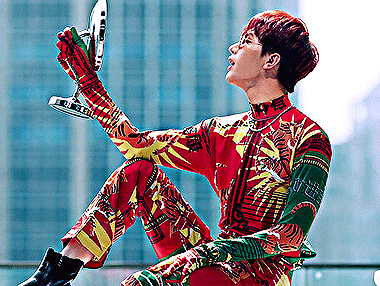
KP was, in part, directed by Pepzi Banchorn, who served as an assistant director on 2019's Dark Blue Kiss and 2021-22's Bad Buddy, and had a quick guest spot in 2022's The Warp Effect. KP was also, in part, directed by Khom Kongkiat, who played Uncle Tong in Bad Buddy, and subsequently directed The Promise in 2023. AND, finally, one of the KP screenwriters is Bee Pongsate, who has co-written so much flippin' BL: Last Twilight, Bad Buddy, Dangerous Romance (😬), Vice Versa, My School President, A Tale of Thousand Stars, 2gether and Still 2gether, and that's not even scratching the list -- you get it.
KP's supporting cast and crew was simply stacked with BL vets, who clearly knew the scene, and who helped to support Mile Phakphum's rookie acting and Apo Nattawin's return to the screen. I'd posit that this group of people knew EXACTLY what references they were putting into KinnPorsche, from actors to tropes, and also knew when, where, and how to innovate around those references to still make this show unique.
Certainly, KP's approach to sex and heat -- by way of Kinn's and Porsche's first drunken encounters (hi again, MaxTul), the uncut intimate scenes between them, and Vegas's and Pete's union by way of, well, semi-torture and/or kink -- was bold enough to be overall quite notable. But again: Thai BLs had been pushing that envelope for years past, and it has continued to do so in shows like MAME's Love In the Air and GMMTV's Only Friends.
In other words: after this rewatch, with the history of the older Thai BLs I've watched under my belt, I don't see KinnPorsche as firstly innovative. But I appreciate the show differently now, in particular for how very obvious it worked to include past Thai BL references in its production, and I actually gained a different appreciation for it.
I also want to made a quick tangential note about Apo and Tong specifically by way of innovation. Dr. Thomas Baudinette, a long-time BL fan and academic researcher on Thai and Japanese queer media, notes in his book, Boys Love Media in Thailand, that an ideal trajectory for a Thai BL actor is to debut in BLs in order to transition to more popular primetime het Thai dramas, as Gulf Kanuwat of TharnType, and Ohm Thitiwat and Kao Noppakao of UWMA and Lovely Writer, respectively, are notably doing at the moment. Apo Nattawin did this the other way around: he had established his career in het lakorns, most notably in 2015’s major hit drama, Sut Khaen Saen Rak, and subsequently left the Thai drama industry after reportedly being discriminated against for his skin tone and fashion choices. And his way back to the industry was through BLs. Taking the lore of Mile Phakphum recruiting Apo for KP out of the picture for a moment: I think this indicates a shift in how BLs are increasingly perceived in Thailand, and even globally, as being a career-worthy genre of content on its own for actors. (Apo's exploding fashion career is proof of this.) And BOC has now recruited another lakorn vet in Jes Jespipat for its third upcoming drama, 4 Minutes.
As well, Tong Thanayut’s very public coming out after the conclusion of KP’s airing is notable for how Be On Cloud has continued to center Tong in its productions after that fact, most notably in 2023’s film, Man Suang, while other out BL actors are not as lucky by way of guaranteeing and attracting future work.
I have a lot more to say about KinnPorsche's and Be On Cloud's impact on the current Thai BL industry, and how I think that impact has affected the marketing and creation of more recent shows like 2023's Only Friends, and 2023-24's Playboyy. But this first post has gotten long, and I actually haven't written much about the actual show itself, HA. So let me say this:
I think it's notable that the first shows that played around with themes outside of romance, like 2020's Manner of Death, and 2021's Not Me, were not perfect shows. We see now how multi-genre BLs are just exploding, what with Dead Friend Forever and the upcoming slew of vampire BLs that are going to drop (and let's not forget the first omegaverse BL drama in Pit Babe -- or should we forget it, I dunno). Not all of these shows are perfect, but the genre has only been around for a decade. There's a lot of time, and a tremendous amount of interest and funding, that upcoming shows can leverage to become better, especially these multi-genre shows that we're seeing more of.
KinnPorsche as well, was not a perfect show. I have some thoughts particularly on VegasPete to offer tomorrow, and I think, overall, that KP could have easily been a shorter series with more impact.
But I'll still give the show some of its flowers, because I think, unlike MoD and Not Me, that KinnPorsche did a better job of centering the Kinn and Porsche romance for dramatic effect, particularly by leveraging comedy. Were there many moments of hibbly-jibblies? Oh, totally. Dudes, also, Kinn fucking forgot about Pete! Pete coming back to the house and reminiscing about Vegas while holding his neck? Eeeeyikes, no thanx. There were a number of these weird bumps that I think could be explained by way of intentional camp (which I think KP did pretty well), but I do believe the show could have been tighter with more editing.
But, I gotta admit: I had a great time re-watching KP. That says something. Was it the heat that tiddled my dopamine cycles? Probably, somewhat. (No shame in my game.) Or -- a more reasonable theory, ha, is that Apo, as a veteran actor, demonstrated more range than I originally remembered. He can really do comedy well, and he timed his comedy perfectly for the absurdities that peppered KP through the series (the bread crawl, the constant throwing of hands, the jumping-on-Kinn when the ghost of Pete showed up, oh shit we're in the forest now, etc). Apo and Tong, in particular, stayed true to the bit many times during the show, and I think the series benefitted greatly from their collective comedic talent and timing -- which I thought was nicely refreshing for the genre.
With that, I'll have more ruminating tomorrow about the show itself, about how I think the impact that KP and BOC have had on the genre after KP's airing, and other thoughts about the cultural moment that KP demarcated when it aired -- see you tomorrow!
[MORE MORE MORE KP tomorrow! And I'll have more thoughts about the watchlist then. But for now, here's the classic OGMMTVC list for you to chew on!
1) The Love of Siam (2007) (movie) (review here)
2) My Bromance (2014) (movie) (review here)
3) Love Sick and Love Sick 2 (2014 and 2015) (review here)
4) Gay OK Bangkok Season 1 (2016) (a non-BL queer series directed by Jojo Tichakorn and written by Aof Noppharnach) (review here)
5) Make It Right (2016) (review here)
6) SOTUS (2016-2017) (review here)
7) Gay OK Bangkok Season 2 (2017) (a non-BL queer series directed by Jojo Tichakorn and written by Aof Noppharnach) (review here)
8) Make It Right 2 (2017) (review here)
9) Together With Me (2017) (review here)
10) SOTUS S/Our Skyy x SOTUS (2017-2018) (review here)
11) Love By Chance (2018) (review here)
12) Kiss Me Again: PeteKao cuts (2018) (no review)
13) He’s Coming To Me (2019) (review here)
14) Dark Blue Kiss (2019) and Our Skyy x Kiss Me Again (2018) (review here)
15) TharnType (2019-2020) (review here)
16) Senior Secret Love: Puppy Honey (OffGun BL cuts) (2016 and 2017) (no review)
17) Theory of Love (2019) (review here)
18) 3 Will Be Free (2019) (a non-BL and an important harbinger of things to come in 2019 and beyond re: Jojo Tichakorn pushing queer content in non-BLs) (review here)
19) Dew the Movie (2019) (review here)
20) Until We Meet Again (2019-2020) (review here) (and notes on my UWMA rewatch here)
21) 2gether (2020) and Still 2gether (2020) (review here)
22) I Told Sunset About You (2020) (review here)
23) YYY (2020, out of chronological order) (review here)
24) Manner of Death (2020-2021) (review here)
25) A Tale of Thousand Stars (2021) (review here)
26) A Tale of Thousand Stars (2021) OGMMTVC Fastest Rewatch Known To Humankind For The Sake Of Rewatching Our Skyy 2 x BBS x ATOTS (re-review here)
27) Lovely Writer (2021) (review here)
28) Last Twilight in Phuket (2021) (the mini-special before IPYTM) (review here)
29) I Promised You the Moon (2021) (review here)
30) Not Me (2021-2022) (review here)
31) Bad Buddy (2021-2022) (thesis here)
32) 55:15 Never Too Late (2021-2022) (not a BL, but a GMMTV drama that features a macro BL storyline about shipper culture and the BL industry) (review here)
33) Bad Buddy (2021-2022) and Our Skyy 2 x BBS x ATOTS (2023) OGMMTVC Rewatch (Links to the BBS OGMMTVC Meta Series are here: preamble here, part 1, part 2, part 3a, part 3b, and part 4)
34) Secret Crush On You (2022) (review here)
35) KinnPorsche (2022) (tag here)
36) KinnPorsche (2022) OGMMTVC Fastest Rewatch Known To Humankind For the Sake of Re-Analyzing the KP Cultural Zeitgeist
...interrupting the OGMMTVC list here to watch War of Y (2022) (watching) in chronology to decide if it gets listed...
37) The Eclipse (2022) (tag here)
38) The Eclipse OGMMTVC Rewatch to Reexamine “Genre BLs” and Internalized/Externalized Homophobia in GMMTV Shows
39) GAP (2022-2023) (Thailand’s first GL)
40) My School President (2022-2023) and Our Skyy 2 x My School President (2023)
41) Moonlight Chicken (2023) (tag here)
42) Bed Friend (2023) (tag here)
43 La Pluie (2023) (review coming)
44) Be My Favorite (2023) (tag here) (I’m including this for BMF’s sophisticated commentary on Krist’s career past as a BL icon)
45) Wedding Plan (2023) (Recommended as an important trajectory in the course of MAME’s work and influence from TharnType)
46) Only Friends (2023) (tag here) (not technically a BL, but it certainly became one in the end)
47) Last Twilight (2023-24) (tag here) (on the list as Thailand’s first major BL to center disability, successfully or otherwise)
48) Cherry Magic Thailand (2023-24) (tag here) (on the list as the first major Japanese-to-Thai drama adaptation, featuring the comeback of TayNew)
49) Ossan’s Love Returns (2024) (adding for the EarthMix cameo and the eventual Thai remake)
50) Dead Friend Forever (2024) (thoughts here)
51) 23.5 (tag here) (2024)]
#kinnporsche#kinnporsche the series#be on cloud#mileapo#mile phakphum#apo nattawin#kinn x porsche#porsche x kinn#tong thanayut#bible sumettikul#turtles catches up with old gmmtv#turtles catches up with thai bls#turtles catches up with the essential bls#the old gmmtv challenge#ogmmtvc#pond krisda#dead friend forever#kinnporsche meta#kinnporsche the series meta
63 notes
·
View notes
Text
Porsche: missed the red flags
Chay: ignored the red flags
Pete: looked at the flags and went “yeah, that’s sexy”
891 notes
·
View notes
Text

KINNPORSCHE TWO YEAR ANNIVERSARY EVENT
— Ep 9: Favourite Outfit
#sorry this is so grainy such are the sacrifices we must make for art#anyway this turned out sooo cute exactly how i wanted it#if u know me u know i love this outfit. i have and i will write extensive dm meta abt it and then cry abt his earrings. due to my nature#altho i gotta say shoutout to the orange overall that one truly is my brand as well#vegaspete#pete#kinnporsche#kinnporsche the series#bl shows#my gifs#userboots#taggingmarion#saturntracks#kpanniversary2024
86 notes
·
View notes
Text
A Deep Dive: Kim’s Fight Scene in Yok’s Bar
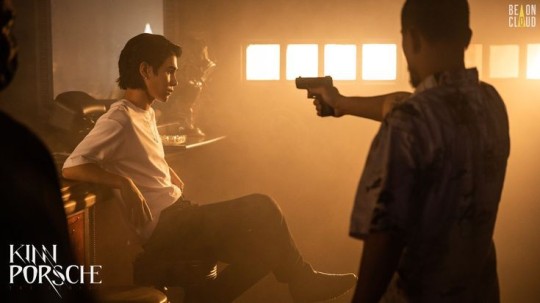
I’ve been thinking about this scene a lot lately, and I just have so many thoughts on it.
Like low-key, but imo what makes this scene so mesmerizing yet also chilling at the same time is the fact that Kim never eliminates the possibility of Chay turning around at any time and witnessing Kim kill in order to protect him.
Whereas Porsche tends to protect Chay by keeping him from seeing the reality of the mafia life (and tragically blindsides both himself and his brother because of it; Chay because he remains ignorant of his new environment and Porsche because his judgement of the risks in keeping Chay ignorant is impaired due to his overprotectiveness), Kim protects him only from the danger of it.
It’s an all around interesting narrative choice from BOC, especially considering that it’s Kim’s one fight scene in the entire series.
I’ve seen many posts on here before of how Kim leaves the dead bodies for Chay like a feral cat or that he really took the mantra “nobody disturbs my man” up a notch or two, and while I definitely agree with all that on a surface level, I can’t help but think there’s so much more going on. Dare I say, maybe even a little manipulative? Hmm.
Because for reals, there’s a reason why this fight scene makes such an impression on so many fans--the KimChay fans (including myself), in particular--and I think it’s because so much of the context of the fight, as much as the fight itself and the events leading up to it, reveals so much about Kim’s character post-break up w/ Chay.
Like yes, there’s the aesthetic reasons and ofc, Jeff Satur and that beautiful face of his that looks like it was sculpted on a Saturday by the gods, but there’s just so much to be said in the way he’d fought and more importantly, ended the fight.
@wildelydawn wrote up an amazing meta post about how Kim fights, for which I highly recommend y’all read if you haven’t already. I definitely agree with the idea that Kim likes to play with his prey when he fights; he knows how to improvise and use his environment as sources of weapons, and he’s definitely got a bit of a sadistic streak going for him, lol.
Now, where am I going with this? Well, let’s very briefly look at the events leading up to the fight: from the moment they break up in ep 11, to one of the very last scenes in ep 13 when Kim finds out that Porsche and Chay have left the tower, somewhere in between those events, Chay had become Kim’s singular goal and most important priority. Whereas before his goal had been to investigate Porsche and Chay’s connection to the Theerapanyakun family, directly after the break up is when this plotline falls through because his investigation hits a dead end at the temple.
For me personally, methinks it’s the moment he finds out that Chay skipped his college interview in ep 12 and what a massive fuck up he’d just committed. As much as I adore him as a character, I don’t really think he knew the repercussions of his own actions until it was too late, alas. Ultimately, he’s not responsible for Chay’s choices, but he can’t deny that his previous actions influenced them.
Whether it was wanting to confess his own feelings to Chay, or perhaps setting him straight because he skipped his college interview, or wanting to keep him safe, or even just to talk to him and clear the air--the point is, regardless of his reason(s), getting to Chay becomes his next target. And more than that, once Kim sets his crosshairs on a goal--especially on this one person he’s got a romantic attachment to--he is positively ruthless.
You barely see it from how fast the camera cuts out, but if you pause at just the right moment, you can see how Kim’s expression is absolutely seething when Korn stops him from going to look for the Kittisawasd brothers (or perhaps even just Chay himself).
This is the expression of someone who’s more than willing to obliterate anyone who gets in the way of him and his goal. This is an expression of utter resentment. This is the expression of someone who’s itching for a fight, because the universe dared to get in between him and his goal.
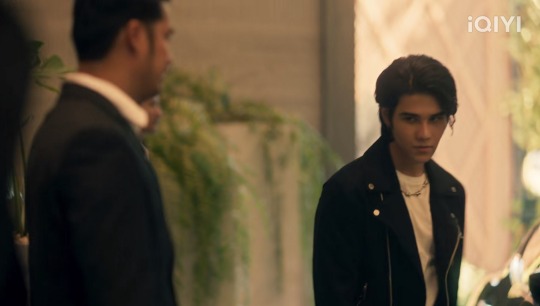
(Side bar: I’m pretty sure part of the reason Jeff got the role of Kim Theerapanyakun is because of how intense his method acting can be. He doesn’t have many roles under his belt just yet, but if you haven’t seen He She It, I recommend giving it a go. His acting in that mini drama is a little rough around the edges, but the raw intensity by which he plays the character of Mike definitely highlights some of Jeff’s natural talent. He knows how to act with his eyes and his entire body, and when given the right director to guide him, as we’ve seen when he portrays the role of Kim, he truly thrives in his role.)
Yet still, for all his anger at being prevented by his father from getting to his goal, he’s mindful enough to know that he can’t just go against his orders either. Korn is the enemy of an entirely different caliber, and Kim perfectly knows how and when to pick his battles.
But it isn’t until we see him in the next ep quietly watching Chay from the bar that another facet of his character growth is revealed to us: by this point in time, he’s comfortable in his feelings for Chay enough that he can finally allow himself to luxuriate in his presence, even whilst knowing he’s in the metaphorical dog house.
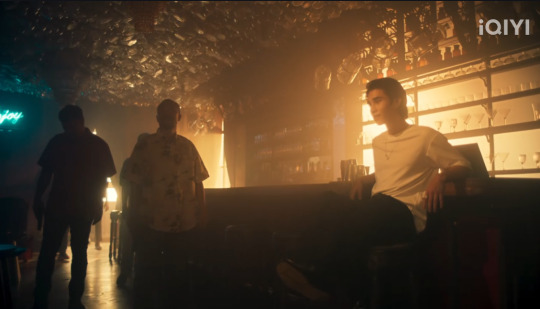
His arms are propped up, his legs are loosely crossed, his body language is relaxed, whilst still very much aware of his surroundings. Keep in mind, this is the first time since the morning of the kidnapping that we see him perfectly content in Chay’s presence, now fully aware that there’s no reason for lies between them anymore. The only one left is the one he has to fix.
Yet, after all this time of trying to get ahold of Chay ( @bitacrytic wrote an interesting piece about Kim’s unsettling behavior when he realized Chay had cut him off, which I also highly recommend), why didn’t he take the opportunity to talk (or whatever it is he intended to do) when he was finally within sight? The camera shot of Chay talking to Yok on his phone, as well as of Kim sitting on the stool, lingers for a good 20-25 secs, so the audience is given a hint that Kim has been there for a while.
So why not take advantage of this chance?
And the answer to this question, I think, is what’s at the heart of the matter and basically defines the connotation of the entire fight.
Kim is not a fool, he knows for the time being he’s number 1 on Chay’s shit list. And because of this, it may be a stretch to say it, but I will anyway: perhaps off screen, from the moment he had him within sight, Kim may have realized that it would do him no good to talk to Chay at that moment. Not when there’s an imminent threat lying in wait, not when the heartbreak is still too raw for both of them.
Most of all, Chay has no reason to trust him right now; it would just be a repeat of their disastrous confrontation in the club.
And he knows all too well that he cannot afford to sabotage what truly little standing he has left in Chay’s good graces. So he plays it cautious and takes the next best thing: he’ll bask in Chay’s presence, keep him company (albeit one-sided). If you scroll back up real quick and see his expression in the promotional image, it’s almost as if he’s thinking to himself, ‘keep your eyes on the prize--on him. he’s the only one that truly matters.’
But even so, Chay’s safety is his priority for the moment and there’s just so many reasons Kim is itching to vent some anger and frustration: the boy he loves has cut him off completely, Daddy is hatching up some plan again, besides the ongoing 4D chess game he’s got going on with all his sons, his investigation led him nowhere. Yet lo and behold, here comes some goons who not only disturbed his peaceful serotonin-gathering session (unbeknownst to Chay), but are also looking to either use the love of his life as leverage in a conflict that barely has anything to do with him, or just outright kill him.
Really, no one can blame Kim for going a little overboard, not when these poor suckers basically offered themselves to him on a silver platter. Lol
While I won’t go too deep into analyzing the physicality or choreography of the fight itself, I’d like to instead focus on all the things Kim chose/chose not to do, which again, says so much about his character and brings me back to my overarching thesis for this long ass rant: Kim never eliminates the possibility of Chay turning around at any time and witnessing Kim kill in order to protect him.
Kim doesn’t call out for Chay to run: this makes sense, it’s a practical choice; he doesn’t want these men to draw their attention on Chay. So long as they’re focused on him, so long as he distracts them--he can kill them one by one.
Kim doesn’t draw the men away from the bar: an interesting choice that seems like it never crosses Kim’s mind. He’s more than agile enough to have led them away from where they’d entered, yet he keeps them all inside.
Kim didn’t wait for them outside: another interesting choice. Arguably, it would have been more efficient for him to have taken some bodyguards and do a stake out. Further still, it’s also arguable this choice is more an emotional one (he wants Chay where he can see him, dammit), but that’s up for debate.
Kim waits until the last possible second to use a gun: a risky choice, but he pulled it off quite well. He doesn’t go for the gun until the goons have him surrounded within Chay’s vicinity, so he goes for fast kills to end the fight even if it’s not his personal preference. Imo, it’s very obvious throughout the fight that he finds some satisfaction in twisting limbs and breaking bone, so good on him that he got to indulge for a bit.
And finally, immediately right after the fight, he never tries to pull this one over Chay’s head:
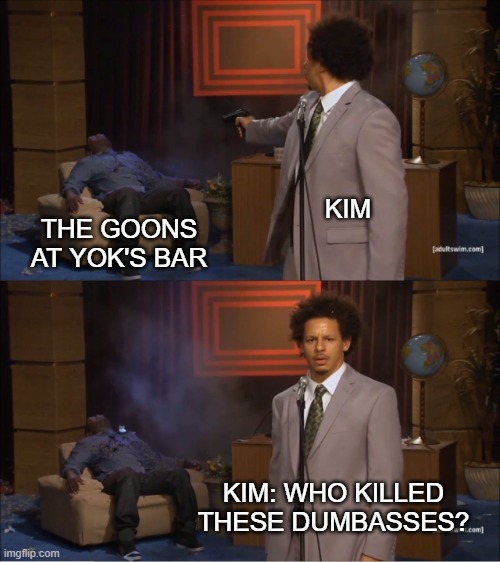
This one is pretty self-explanatory, I think. Hahaha.
But after Kim shoots the last man, he doesn’t linger for too long. Which again, why doesn’t he take advantage of yet another chance that’s fallen onto his lap to talk to Chay? The danger has been dealt with for now, after all. Why not at least attempt at some sort of clean up, maybe pile the bodies on one corner so Chay doesn’t trip over them? :’D If not to talk to Chay, why not at least linger in the shadows, to make sure Chay is all right (he’s bound to turn around eventually)?
Instead, he walks away, still panting a bit from the fighting and without a doubt, from the adrenaline rush. His body language is hard to read because his silhouette is blurred, but it’s at this point that BOC could have easily concluded this scene.
They could have left this scene as is, and made the aftermath of the fight as vague as possible, because for what it’s worth, it would have still accomplished one of the main points for KimChay: Kim’s priority is Chay’s immediate safety.
But it’s not the end of the scene. BOC made damn sure that we would see the aftermath, and with it--the changed dynamic between these two characters and the very implications of it. They didn’t leave it vague whatsoever, they pretty much shoved it in our faces.
This scene--this f*cking scene RIGHT HERE--blows wide open a potential trajectory of KimChay’s love story if/when we ever get a season 2.

I think for the first and only time in the show, this shot of Kim sitting on the stairway, enjoying a cigarette after a murder spree, mind you—is the first time we see him fully stripped away of any pretenses in not only the way he loves and protects someone, but how far he can get lost within his own emotions when he has no reason to hold back. He doesn’t even look the least bit concerned for Chay’s emotional well-being, because that’s not his priority when he chose to leave those men lying on the bar’s floors.
If anything, in this specific situation, not holding back benefits him greatly.
For the first time, his character in the show is explicitly elevated to the same level of batshit insane as Kinn and Vegas, perhaps even beyond them.
We’ve seen how WiK had won over Chay, of how tender Kim could be with him, but the fight in Yok’s bar and the conclusion of it afterwards, demonstrates how far Kim’s sharpest, most deadliest aspect of himself—Kimhan, will go in order to win back Chay. Even in trying to get Chay within his orbit once more, he remains just as calculating: he doesn’t let his own gut instinct (actually wanting to talk with Chay) get the better of him; he uses the situation, in this case--even Chay--to give himself the best advantage. Can you imagine how terrifying that is?
It’s no wonder Korn calls him the strongest, yet most dangerous of the Theerapanyakul heirs: regardless of whether Kim holds back or not depending on the given situation, he remains just as sharp, just as deadly, just as cunning. In the first KP novel, Korn presents a question to the readers indirectly: in their world, is love a weakness or is it strength?
For Kim, the answer is obvious: it’s a weakness, but he won’t allow it to be one for himself or for Chay.
And due to all this, there’s only one conclusion I can come up with as to what this shot of Kim sitting on the stairway outside Yok’s bar was trying to accomplish:
Kim—this conniving, devious, gorgeous motherfucker—absolutely wanted Chay to see the dead bodies now littering Yok’s bar.
In fact, I can even argue that he seemed to have been waiting for confirmation that Chay saw his “present.” That he had all the time in the world to make sure his bae got a good look at his kills.
Why, you ask? Simple. Kim trusts Chay’s backbone made of steel. He trusts him to be able to handle it. Why else would he let himself enjoy a smoke after killing 6 people in 6 mins? Why doesn’t he look concerned?! Why not give Chay some comfort, goddamn...! We know this fucker is in love w/ Chay, the dumbass was crying over his polaroids earlier that day. //sobs
But in all seriousness...Kim has firsthand experience of going up against it, doesn’t he? He himself saw how determined Chay could be when he cut himself off entirely from Kim, both from when he pulled his hand away in the club and then blocking his number a day or two later. I don’t necessarily think it’s that Kim overestimated Chay’s love for him, but rather he initially underestimated Chay’s resilience in keeping him away after breaking his heart so terribly.
This son of a bitch (affectionate) sobbed his pathetic heart out after finding out Chay blocked his number, probably took a good look at himself (and Chay’s cute polaroids), and came to one conclusion: “yeah, Chay can handle me. I can go all in now.”
In fairness, Chay’s steadfastness can only improve and strengthen from here on out. Kim--although in love with Chay, but does have his moments of volatile moods and cold verbal wit--is not an easy person to love, as Chay is slowly finding out the hard way. He must be able to confidently call Kim out when the latter needs to be reminded to respect him, that Chay will not take any of his shit.
Ironically enough, in creating an original story for these two characters in the show, it also brings them closer to the dynamic they have in the novel, imo. I myself have only read parts of the novel, and because we barely see KimChay in the book, it’s hard to tell how much closer show!KimChay is to novel!KimChay, but there’s hints of some similarities here and there in terms of character dynamics. Make of that what you will~
Let’s play Devil’s Advocate for a hot sec though, and address the rebuttal: “but won’t this only drive Chay further away from Kim and a life in the mafia?”
My answer to that is: will it though? Chay has more reasons to stay in the world Porsche forced him to enter than he ever has in leaving it. BOC cemented this fact when they decided to keep Namphueng alive, nevermind the fact that Chay’s one positive, healthy parental figure, is now the minor family head and as much as he’d like for it not to be true, he’s still in love with Kim.
But to reiterate, Kim trusts Chay’s backbone made of steel in a way that Porsche doesn’t (again, due to aforementioned overprotectiveness, which also serves as the fundamental difference in how they both protect Chay). But the reasoning behind placing his trust in Chay isn’t entirely selfless either.
He trusts Chay to be able to handle the disturbing scene of the dead bodies he left behind, because he has something to gain from it.
By leaving behind the dead goons for him to find, Kim inadvertently breaks another piece of Chay’s upright perception of the world, ensnares him further into Kim’s reality—and most of all, to Kim himself.
It’s a terrifying level of honesty (and wooing??) coming from Kim because it’s so brutal in its execution. What makes it even more frightening is that he’s genuinely doing this out of his desire to be with Chay. His priority during the fight is Chay’s safety, yes, but his overarching goal after their break up remains the same: to get Chay back.
It drives home the fact that although Kim loves only a handful of people in his life, he loves them fiercely to the point of questionable insanity.
#kinnporsche#kimchay#kim kimhan theerapanyakul#porchay pichaya kittisawat#meta#kinnporche the series#kpts meta
893 notes
·
View notes
Text
KP rewatch continues... I am always very fascinated by the first lines that a character says and/or the first lines two characters say in the presence of each other - especially on a rewatch, when you can view the plot holistically. I want to talk about the first thing Kim says in the presence of Chay, and mind you this is the first thing he says as WIK. My first thought was that Kim is literally (like immediately, hit the audience over the head with it,) revealing his nature (as Kim) to Porchay:
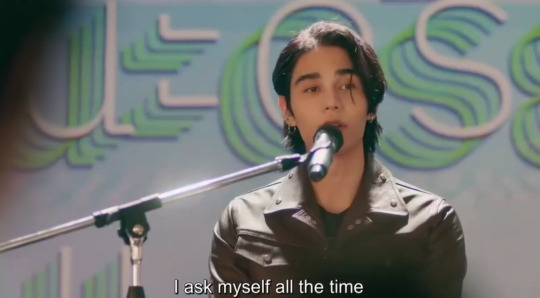

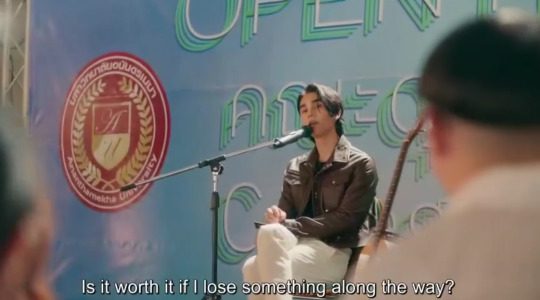
It's kind of the thesis of Kim's arc, though he paints it here as a rhetorical question. Kim has had to make sacrifices and lose things all his life to get to the place where he is now. He goes on from here to pursue a romantic relationship with Chay on some pretty selfish and dishonest grounds - in the name of reconnaissance on his own family's organized crime - and once Chay figures it out, Kim loses Chay as a result. (Not convinced the immediate consequences of all that were "worth it," based on the way he ends up alone in his apartment looking forlornly at those polaroids of Chay.)
Anyway, god, the way the camera changes to Porchay when Kim says, "But if we love something so much with all our hearts..."

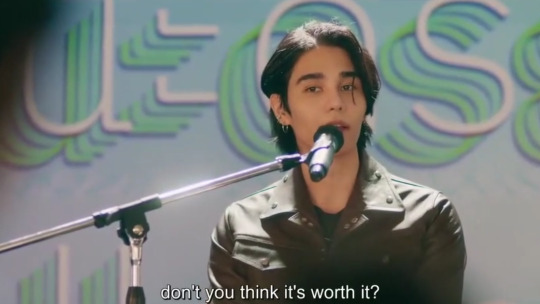
And this is like the conclusion to that thesis. I always wonder if I miss subtleties through translation, of course. But I think this is written to be a double-meaning about their relationship. My interpretation being: what they lose along the way is the pretenses of their relationship. Chay approaches Kim with this built up unrealistic ideal of who WIK/Kim is, which Kim could not possibly do a better job of ripping apart. Meanwhile Kim only understands Chay in a one-dimensional way - which is why he so greatly miscalculates their dynamic - but this too is dissolved once he faces his own feelings. The evolution they each go through to arrive at true mutual understanding is an incredibly painful one, but it also frees them to love each other honestly if Chay ever unblocks Kim post-canon.
#kinnporsche the series#kinnporsche rewatch#kimchay#god i am so in the k-hole rn#that would be the kimchay hole girls no ketamine on a friday morning#i can't not write meta about this#i do not feel normal about them
100 notes
·
View notes
Text
man you can’t say the antagonists in Kinnporsche aren’t top tier tho like:
tawan is such a cunt but I can’t say I don’t love what he brought to the show he was such a little bitch I hated every second he was on screen and yet loved it to what an absolute unhinged ho with a milk metaphor fetish was ready to risk it all for grade a dick love that for him
vegas?? I mean fucking Vegas like foe, friend, bitch, ho, fashionista, pathetic meow meow, tried to kill Porsche twice, helped Porsche find out the secret of his family an absolute pathetic meow meow man who cries when his therapy hedgehog dies, utterly unhinged yet sexy THIS WASN’T THE FUCKING PLAN top fucking tier
Gun? Oh fuck Gun like The Worst but the worst in the best way narratively!! like contrasts so well with Korn’s The Worst-ness Gun is like I hate my gay son and I abuse him and Korn is like pathetic I love my gay sons (and nephew!) and abuse them emotionally, systematically, sinisterly, secretively, get on my level
#kinnporsche#kinnporche the series#pikachu back on my loving kinnporsche unhinged meta shit#even on the smaller scale of antagonists like ken and big (emotional antagonists for porsche in the beginning) are great#ken being the traitor? top tier#big not being the traitor and dying to protect porsche in the end? TOP FUCKING TIER#the true antagonist all along tho was kim meeting human emotion in the form of chay cause wow did he get bodied
578 notes
·
View notes